#to play what’s considered the villain forcing you to know them and their story etc. I just really like these two games
Text
Gonna rewatch my favs play tlou it’s been so long
#dude I remember when this game fucking came out and I watched my cousin play it all night long in the summer or whenever it came out and I#was so obsessed with it and still am. truly one of my favorite games man wished I could play it maybe I’ll see about getting it since I’ve#got a console now but I’ve seen quite a few play throughs of the first and one of the second also second game gets too much hate#I actually liked it. I understand why people were upset like that was an insane choice to make but they did it and you gotta respect them#for taking such a big risk in that but I really didn’t hate Abby and I actually really liked that you got to play as her what a cool concept#to play what’s considered the villain forcing you to know them and their story etc. I just really like these two games#the last of us#tlou
3 notes
·
View notes
Text
ik a common pet peeve ppl have with media is that trope of a villain having a really good point about society then immediately killing a baby to achieve it or smth and how it's used by people in power to demonize these criticisms of them. but i do think in bsd when antagonists make a good point it still stands and it's still a good point regardless of what they do about it, and the narrative does not want you to perceive them entirely negatively. like, there's a reason atsushi spends a few chapters in a conflict bc he agrees with fukuchi's ideas, just thinks his methods are harmful. the story lingers on it bc it wants you to stop and think and see the good in them, i think, and not to be mean and turn it around like a "gotcha! you are just as bad for agreeing!" or smth.
i think it all stems from how every character in bsd is morally grey in order to humanize them. every antagonist is presented in a positive light at some point (only exception i can think of is fyodor, who so far hasn't been presented in a really grey way either), their motives or ideals are laid out so you can understand WHY they're doing the things they're doing, and eventually they end up working with the protagonists because well. they're all humans at the end of the day.
the thing driving all protagonists in bsd is simply to keep living (each have their own asterisk next to that, but i won't get into details) and usually keep others safe. they beat the forces that stand in their way of achieving this, but for a moment, these forces' own goals get reflected back onto them, and they become a vehicle for them as well, at times.
it's less of a "villain makes a good point then kills a baby to make you disagree with them", more like "villain makes a good point but the story lingers on it so both you and the in-universe characters think about it and consider it. they also kill a baby but that's more like a personal character flaw that might get ironed out of them with the power of friendship"
that's also why wildly loved characters that are generally considered positive start out trying to kill the protags (akutagawa, chuuya, lucy, poe, sigma, the hunting dogs etc). you know WHY they do this. you know what led them here. you also saw other sides to them - silly moments, helping their comrades or innocent bystanders, positive interactions with the main cast - which help make them feel more human, thus making them easier to understand for us as readers.
idk man i think it's p cool
EDIT: i will also add!!!! that imo fyodor seeming purely evil despite bsd's attempt at humanizing its characters!!!! is less of a fault in writing but rather showing how he dehumanizes HIMSELF. he views himself as more than human. characters like sigma view him as more than human. and so, for now, the narrative will treat him as such too - not bc he's right. but bc it serves his current story, and hopefully a future arc will have him unlearning that, or more layers will be peeled from him so at least we as an audience can see his humanity (i have a feeling the information sigma got from him + the injury dazai gave him + him being bested in general + whatever the fuck "that man" comment was, will all play a part in that)
#dan rambles#there is no thesis to this EXCEPT!#i hate the tiktok fandom for hating on mori when the whole point of him having a gross side about him -#- is not to demonize but to add a layer. you're free to feel uncomfortable but this knee jerk reaction to boo whenever he's-#- so much as brought up is frankly pretty childish imo.#it does fall under this topic. bc this is his equivalent of killing a baby. as in. it doesn't cheapen his morals in the context of the stor#it might in a different story. but imo bsd requires engaging on a deeper level. hence this whole post#and this deeper level requires reading beyond the surface level stuff that's mostly used for unfunny gags anyway#. sorry i am very passionate abt mori. my guy deserves better fr 😭#tldr no one in bsd is purely evil you are doing a disservice to the story by perceiving them as such
16 notes
·
View notes
Note
Your shipfics collection!!! Hmmm well there's 11 stories, so pick 11 of the questions and answer one for each of the stories.
10 (Cerise/Darling) : I had honestly seen this ship floating around and wanted to try my hand at writing it! It was definitely interesting trying to figure out their dynamic, and part of me wants to write them again since this chapter was the first EAH fic I ever wrote and I was still learning the characters.
7 (Raven/Apple PT 1): So the title "Call Me Serpentine, I'll Call You Mine" came from a number of things. Obviously the dragons of EAH were an underlying plot point of this story, not only addressing Dragon Games' aftermath but also having the dragons act as literal wingmen. Also there's the common insult of snake, which is to show Apple's secretive nature during the whole of Dragon Games. Then the "Call You Mine" part was just from Apple's love and how she's willing to let Raven be angry at her as long as Apple can still love her.
1 (Darling/Ginger): There is a surprising lack of cooking/baking fics in the EAH fandom, despite it being such a great medium to work with. This was the first one I wrote, and any of my friends can confirm this is one of many that I have written. I mean just look at Dishes and Cutlery xD
11 (Raven/Apple PT 2): Writing Raven's panic was honestly my favorite scene in this entire shipfic, even compared to her and Apple getting together. Panic attacks are often really badly written, and I was wanting to show how it could be without media glorification. Granted the nightmare is a bit exaggerated, but some people have had full blackouts during their panic attacks and gone through repressed memories.
9 (Ramona/Rosabella): For a moment I did consider writing these two actually meeting through an animal shelter stint and bonding that way, but I thought that Ramona's outbursts could be used in a way to show her softer side.
5 (Kitty/Maddie): Hardest part to write was when the narrator was knocked out and I had to start everything from dialogue points. You don't realize how much you depend on narration up until the story calls for none of it! It is a fun writing challenge, so I highly recommend doing a little practice like it though!
6 (Briar/Faybelle): This fic is a bit more special to me because this is doing what EAH didn't really do and explore the actual terror that Briar was going through with her destiny. The Sleeping Beauty story is crazy on so many levels, and there's no way anyone could just brush it off. I wanted to see how it'd be if Briar tried to prevent her 100 year's sleep in a bad way, and then have Faybelle step in and actually be a good person as she is.
12 (Darling/Raven): Writing Apple in a negative light for story purposes ;-; . Like I'm sorry, I know Apple had some bad takes, but she's literally a teenager forced to behave as an adult and having to uphold to a lot of standards. She's not going to know everything and certainly say some bad things, but she learns and reforms herself in canon. I felt like one of those cold-takes people making her seem so hateful and villainous.
4 (Cerise/Cedar): "And we spent time together. Isn't that the most important thing?" Don't get me wrong, I love complex dates and the hijinks of them going wrong, but I do wish more fics and couples would just enjoy each other's company as is and go with that. Just write a ship having some down time and chilling out. No dinner dates, movies, theme parks, etc. etc., just have them chill.
11 (Justine/Ramona): The thing I liked best was showing that Ramona probably isn't all that great with her bravado and pride. We didn't get a lot of her in canon, but she just really seems to be the kind of person to value her strengths and feats above other traits of herself. Her constantly needing to be the physically strongest played really well into this fic, and I won't lie in saying I loved having Justine get snappy at her behavior.
#ever after high#ever after high fanfic#raven queen#apple white#darling charming#cerise hood#briar beauty#faybelle thorn#cedar wood#ramona badwolf
13 notes
·
View notes
Note
Tell me about a spider or your fav oc (I still can't think of my own favorite of so don't worry about taking long with this)
SPIDERS.... I'll tell you about the spider family in my superhero story.
Alexander Wolfe and his adopted son Elliott Wolfe are the spiders--honourary position to Avery, biological son but not spider-coded (he's Normal).
Alexander Wolfe haunts the narrative!! When superpowers started emerging in the world, he changed the focus of his prestigious family business to helping people navigate their powers. Have a baby with a sonic scream destroying your house? They can help with that. You keep disappearing and can't come back? They can help with that. Etc etc. This developed into them funding and assisting the city's superhero team!! The Wolfes were considered a huge philanthropists and idealists for all the good they did in the changing world around them--but Alexander and Avery alike aren't good with 'publicity', so Elliott acted as the 'face' for all their good work. He was the 'human' face you could trust in the scary unknown. Charming and witty, Elliott is universally adored!
Then it came out that Alexander was moonlighting as a giant spider and sowing chaos through the city.
Nick, our protagonist and technically my fave OC, unfortunately stumbles on evidence of Alexander's identity. They clash and Nick accidentally takes Alexander's life in self defense. Elliott witnesses this happen, knows to address the monster by his father's name, and in his grief reveals that he also was in on his father's crimes. This is a horrific event that shatters a system the city so adored, ruins Nick's life, and completely ravages his relationship with Elliott. Alexander dies and the age of villainy dies with him: when a hero can kill a villain, no one wants to play the game anymore.
Elliott is locked away as an accomplice and, given that the city adores him, this is considered unjust!! Where is the proof?? How can he be blamed?? He's just a little guy!! (he's not). After a suspiciously short time, Elliott is released, and Nick's regular depression surges into hyper-pissed-off-depression. After being forced to hang up his costume, and barely coping with what he's done, Nick relives it all over again. At the same place where he faced Alexander, he fights a revenant: a man in a mechanical spider suit, who seems to recognize him, and who laughs when he calls him 'Wolfe.'
It spirals from there: Wolf Spider is back!! Nick knows it's Elliott in the suit, and yet no one wants to believe him. Elliott declares war on every hero left in the city, bringing back villains under his command, and Nick has to endure the consequences. He doesn't feel like he deserves to be a hero anymore, but his heart won't let him stand idly by. Elliott is the first life that Nick ever saved in his superhero career, and now he's fighting tooth and nail to stop Elliott from hurting people, while knowing he's wronged Elliott in a way no one else possibly ever could. They feel mutually betrayed by one another, too tangled up in each other to be rational, and they keep making out when they're not supposed to.
I just think they're neat <:
9 notes
·
View notes
Note
This is way too long but I wanted to hear your opinion on this, so I'd be glad if you answered, lol.
Do you think Vecna is going to try to make Will join him? I think Henry/Vecna/001/Mindflayer (God... the dude has so many personas) is essentially Will's foil in the story. Many people think the parallels between them prove that Will's gonna become a villain or get possessed but I don't think so. Him becoming a villain outright makes no sense, unless he's forced to. I don't think he's fully gonna be possessed because we've seen the same thing happening in S2, so it would be pretty boring.
If the characters try to use Will's connection to Vecna as a way to stop Vecna then I'm guessing Vecna would target Will. I don't think he wants to kill him though. This whole situation between Vecna and Will is kinda weird to me because in no way in the story Vecna actually tried to kill Will.
When he took Will to the UD, he didn't really kill him, Will managed to survive while all of the other characters died in the UD. When in S2, he tried to possess him but again Will states that the Mind Flayer/Vecna actually didn't want to kill him, he wanted to kill 'everyone else'. So what is up with Vecna and Will exactly? Why their connection stayed the way it is (and only got stronger as the series went on), why do they have this connection still?
I used to think El is Henry's foil with all the parallels considered between them, but if you think about it Will seems more of a foil to Vecna. Plus, Will and Vecna have this mysterious connection that still hasn't been fully explored yet and they have a psychic connection.
Other ominous things to consider:
1- Vecna specifically targets Will and takes him to the Upside Down. Why did he choose Will specifically, did he consider Will to be like him? He also didn't kill him in either seasons
2- Upside Down is stuck on the same date Will went missing.
3- Their 'emotional/psychic connection, the parallels between them visually, both being outcasts, both being described as sensitive, both being rejected by the society, both being artistic etc.
4- Will literally knows how Henry feels, what he thinks and how he thinks. He can also sense if he's alive or not. How deep their connection goes?
5- Henry probably knows everything about Will too, then. Kinda creepy if you ask me.
6- Something others have also pointed out, it seems like Henry ''appears'' whenever Will feels sad/devastated. Vecna appears at the SnowBall dance (when Will was forced to dance with a girl, and when the literal script said ''his eyes on Mike'', so we know Will wasn't having his best moment at that scene), Vecna appears in the hospital scene when El and Mike are together and Will is kinda third wheeling again, He appears after Mike and Will fight and Will destroys the Castle Byers (this, honestly, the biggest evidence so far out of everything), He appears during the theater when Mike was late to their ''movie date'', He appears when Mike and El ditch the rest of the party in that hill in S3, etc. Why does he constantly appears when Will is implied to feel sad/devastated.... and those moments always seem to be in the presence of Mike? Does Vecna know Will loves Mike? He seems to, tbh. Don't know if the show outright will confirm this subtext but it's getting too obvious atp, so why not.
Writing this stuff out, it kinda implies that for Vecna to get defeated, Will's gonna play a big role alongside Will's feelings for Mike, and probably Mike's feelings for Will.
(conclusion: Will is Henry's foil and he doesn't end up becoming a villain or getting possessed by him because the story structure doesn't make any sense for Will to end up like Henry when they are paralleled in a sense to show the contrast between them, not making Will the next Henry. I also think Will and Mike's love for each other seem to be the key to defeating Vecna the next season tbh.
Yeah, I don't agree either with the ideas that Will would become a villain by choice (I mean, have those people actually seen Will lmao) or that he'd get possessed again because they've already done that. I mean, you could say they've already done the "join me" thing with El and Henry too, but.. I'm almost thinking that's part of why Will has suffered so much throughout the whole series and has never gotten a win because they want him broken down for a moment like that on a broader scale. A moment where Will, for maybe even a split second, might think everyone would turn against him, maybe even for being "different". The two plots for him - his sexuality and supernatural plot - could be intertwined, and self-acceptance and returned loved from Mike may play a huge part in him finding his strength to turn Vecna away. A classic.. Should I Stay Or Should I Go? moment, one might say. Being foils to each other, I could see Vecna totally taking advantage of the "I'm just like you" thing, trying to get through to him with relatability, some creepy attempt of a heart-to-heart, maybe even promising Will a world where he could have the happiness he wants, but that he could only get it through him. Making him think that he's all he really has and that everyone else already has someone else to lean on. There's something about Will we just don't know yet, some ulterior motives on Vecna's part for why he wants him, and that's still TBD, but I'm interested to find out.
16 notes
·
View notes
Note
💀🥘🕹️🎻🎒🔮 for don, dominic, pascal, and juliette :D
💀: Enemies or Rival
don: nobody, i don't think don is the type of sim that makes enmities, i mean maybe people who find out he had 218372 affairs while woohooing with them will hate him and consider him an enemy but he genuinely doesn't care
dominic: THE WATCHER and loki for being circe's husband
pascal: loki and circe for nervous reasons
juliette: nobody she doesn't care about the feud so she doesn't have enemies or rivals and yes i ignore that she consider bianca her enemy cause for me that never made sense???? she is literally dating romeo how is she going to care about the feud and have enmities with some monty
🥘: Favourite Food
don: he apparently has italian ancestry, according to the names of his parents and grandparents, so i think spaghetti and more home-cooked foods which he unfortunately hasn't eaten in a long time
dominic: lobster and other things rich villains would eat
pascal: anything jenny cooks cause i think she is a great cook and she learned everything she knows from kitty, so whenever pascal eats jenny's food he remembers his mother and his childhood<3
juliette: she loves isabella's baked alaska whenever isabella makes it, romeo keeps a piece and takes it to juliette secretly so they can eat together on some secret date
🕹️: Video Games they like or Play
don: idk he looks someone who likes to play fifa
dominic: he doesn't have time to play video games, his evil plans to control minds and beat the watcher waste all his free time
pascal: he likes old video games and games like zelda and mario and stuff but pascal's real passion is good old fashioned chess
juliette: THE OFFICIAL GAMER GIRL juliette definitely has a twitch stream channel and she plays overwatch and stuff that gamers play idk what im not a gamer but SHE IS a gamer it's her true hobby
🎻: Musical instrument
don: he plays acoustic guitar is something very seductive and turn on many sims i wish we have an acoustic guitar on ts2 i'll look for cc later
dominic: piano obviously a villain isn't a real villain if there isn't a piano in the living room
pascal: he's not very good with musical instruments
juliette: she looks like someone who participates in the school orchestra actually consort kind of forced the three siblings to participate in the orchestra so juliette plays the clarinet there
🎒: University Major
don: biology
dominic: biology
pascal: physics
juliette: maybe drama? or literature idk
🔮: Something Random
don: ummmm i have several things about don cause i like him a lot and i don't really like how people see him sometimes, i mean, everyone interprets him the way they want, but anyway, first about don x cassie, don genuinely likes cassie a lot and i like to think they met during college and that their story is genuine, like, no interest in the goths money, anyway, he likes cassie so much and thats why he broke off their engagement, cassandra is a family sim, she wants to get married and have her own family, but don isn't like that, and he couldn't make cassie happy, cause he wants to be free, he wants to have fun, meet new people etc but even though he is very smart (he is a doctor, and to study to be a doctor you have to be smart) he's kind of dumb when it comes to feelings so instead of ending the engagement in a civilized way he decided to do it right away and left cassie at the altar lmao oh and there is also that hc that don is a pediatrician who was circulating around these times i love this hc and i agree sm, don really likes children and if he is a father he will be a very nice father, even not living in the same house, he will do his best to be present in his child's life
dominic: i'll be honest with you i couldn't think of anything about dominic lmaoooo i think he's already a very developed character in his own and i really like him a lot but idk i couldn't think of anything lol im sorry
pascal: pascal is the best father in the world seriously if there was a competition between simnation's fathers pascal would definitely win and he always goes to all the parties, meetings etc that happen at tycho's school and he is super friendly with all the teachers and other parents and also with tycho's friends
juliette: for me shakespeare is something that actually exists in the sims universe and veronaville is kind of a funny coincidence but whenever juliette is with romeo she makes him swear they'll never fake their own death or anything like the original r+j did and end up dead just to be together and romeo always laughs about it
#this got long im sorry lmao#gaypleasantview#ask#ask game#hcs game#don lothario#dominic newlow#pascal curious#juliette capp
13 notes
·
View notes
Note
“🖊“
Pray tell me, have you heard the tale of Johannes, the supervillain geologist?
So fun fact about this character: He's actually an OC i developed for, of all things, DC comics
So I'm sure anyone even halfway familiar with DC and the stories they tell know that one of the most popular storylines they like to recycle is that of metahuman rights. Anyone whose seen the Justice League/Young Justice cartoons knows exactly which one I'm talking about: government gets scared of superpowers, theres a bunch of people dehumanizing people with super powers, amanda waller is usually there, sometimes they throw in doomsday and a bunch of other genetically engineered super weapons, the whole shebang
There's also the joke about mad doctors/scientists in non-biology/mechanics based fields, where like the evil psychologist is NOT going to prescribe you your medication, or the evil linguistics major is going to say sentences thatll Hurt You, etc
So I had the idea of an evil geologist with earth based powers who isn't like FULLY evil but more that it's a snowballing joke of him getting more and more infamous because he's just too damn powerful
The thing with Johannes is that he's supremely powerful, THE single most powerful geo manipulator ever, and as a result he's highly feared. However, instead of using his powers to get rich through crime, he gets rich by using his powers for geological digs: instead of robbing banks, he's just digging up the earth, getting any rare jewels/resources or other things, and putting it back no sweat. Of course, any government would take offense to a metahuman using their powers like this and not giving them a share of the cut, to which he's like "oh I'm sorry, was I not causing enough permanent damage to the environment or something? I know you guys are the masters of polluting the planet and all, so..."
This of course gets a bunch of people mad at him, to which he ultimately pulls a bender futurama and goes "alright FINE i'll make my own nation with blackjack and hookers!" So, he goes to the middle of the pacific ocean, some of THE single most isolated places on Earth, and just slowly but surely starts causing a series of controlled eruptions to make his own landmass where he can live.
Now what does any of this have to do with the establishing first act? Well, Johannes told every single government in front of the entire world to go fuck themselves, literally made his own nation, and is also one of the single most wealthy people on the planet from all this.
Of course, he's going to have refugees from these nations come to him.
And the thing is, he's not nearly enough of an asshole to tell these people to go back where they came from, but this in itself also raises even more red flags with political opponents, and at this point he's now considered a hostile nation whose slowly building up his own force despite the fact that he's literally just an abrasive guy who wanted a beach house where he could fuck around with his powers
And with everything else established about DC comics and their world, I'm sure you can imagine how these events would play out, where he goes from random guy to high profile villain to leader of his own nation and advocate for meta human right, EVERYONE wants a piece of him for whatever reason and he's just so very tired, why him?
5 notes
·
View notes
Note
Can't believe Saejoong's destiny was to be the Evil Queen (well, King) and Mother Choi's was to be Snow White, and now... the twins each have to take one of those torches....
Oh, yeah, destinies are not defined by gender in this show. So, you could have a Mad Hatter in one generation who is a man and a Mad Hatter who is a woman in another generation, for example, since that is one of the first characters you'll meet that's like that. So, you could have someone who was born to fit the role, but it doesn't matter what pronouns they use or how they identify, they're already locked into it at birth. They'll just call you whatever label feels right when the story is ongoing, so, an Evil King, Evil Ruler, or Evil Queen, etc. The legacy just started with XYZ, but it's not obligated to stay that way.
Snow White is like... the biggest story in the land of Ever After. I don't think Saejoong could get away with this. There's actually a character in the show who has to hide her identity because she is actually the daughter of the Big Bad Wolf and Red Riding Hood! Her older sister is going to be forced into playing the Wolf and she's been pushed into being the next Red. But, nobody can know that since it's against the rules.
People pay close attention to this stuff from the start. If this was going to be a solid AU, we'd have to pick a story that is well-known and powerful, but there would have to have been some kind of major magic used to manipulate the world into believing something to be a good cover-up for Saejoong. It's not impossible, it's a world of magic, after all. We could definitely... hm.
Well, this is a possible idea because we'd have to assume that the twins are considered legitimate children and there's no need for them to be hidden. However, I could assume maybe... just maybe, Saeran is forced into the Snow White destiny and Saeyoung is forced into the Evil Queen destiny. They separate the twins and force them to play the roles, but nobody knows they're twins because Saeran would've had his hair dyed and his eyes changed via magic.
That'd be tricky to sort out in my head, but it'd be painful and it could cause a lot of drama since the twins wouldn't want to hurt each other in any way... but destiny... destiny is a dangerous thing. Saeyoung has to take the burden of being the "villain" but... God. The angst here is a painful thought.
14 notes
·
View notes
Note
Having asked your thoughts on designing Frankenstein's daemon, might I now ask your thoughts on bringing Count Dracula from the written word into illustration? (I'm definitely in favour of the 'Hairy Old Mountain Man of Horror pretending he's people' look from the original novel; one of the small tests too many Draculas fail to pass is an absolutely tragic lack of the Evil Beard and/or Wicked Moustache explicitly described by Mr Stoker).
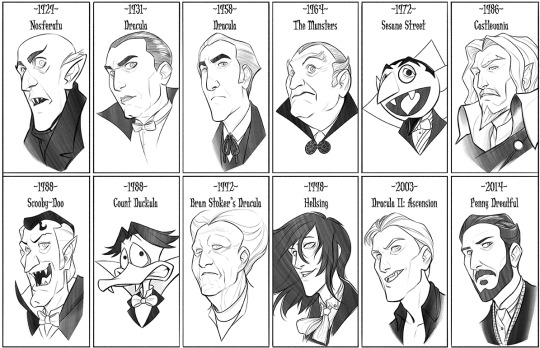
Unlike with Frankenstein, where I think the design needs to be painstakingly thought out in order to achieve the best balance of the creature's traits for horror and tragedy alike, I think with Dracula you can actually just take an approach of "whatever works". Because as I mentioned before, I think much of the appeal and longevity of Dracula is how the character's both a layered villain as well as a shapeshifting narrative force that can be tailored to whatever you want to do with. Granted, there are bad or dissappointing Dracula designs, of course there are, but in regards to the leeway you get for reinterpretation, you get a lot more of it with Dracula than with other literary icons.
Like with Frankenstein, I'm gonna bring up how I'd tackle a less grim, more comedy-centric Dracula first, one that's less a force of horror and more of a charismatic villain, and I think to that end I definitely agree that people are sleeping a lot on the hairy old man barely-passing-off-as-humanoid of the original story. Despite very much loving these performers, I'm actually not a fan of takes that mold Dracula too closely to people who've portrayed him, like Bela Lugosi and Christopher Lee, partially because I think it's a waste of an opportunity to create your own Dracula design. Since I can't draw (yet), I'll do what I usually do and make a board of images to try and convey some of my thoughts on one way I'd design Dracula.
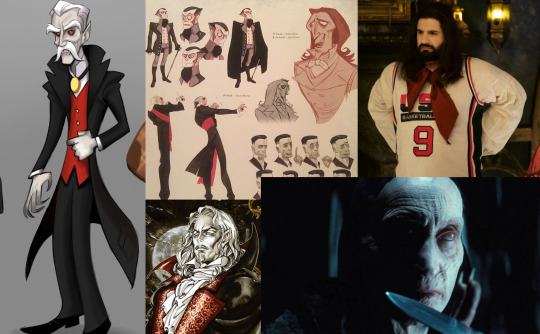

(Pictured: Kiwi's design for Dracula, Hotel Transylvania concept art, Nandor, Castlevania Dracula, Charles Dance in Dracula Untold, Vladislav, a Transylvanian rug)
I used the images in my other Dracula post and I’ll post it here again because I absolutely adore @kiwibyrd's designs for Dracula and it's main heroes, in particular I love the way it strikes a good balance at making sure Dracula looks distinctly separate from the humans, but not too much that he couldn't conceivably operate in society as just a harmless old man. I also adore the mustache and bushy eyebrows and pointy ears and I think these three are wonderful features to keep on any Dracula design. I'm also very partial to the Hotel Transylvania concept art, even if it makes me incredibly depressed to look at all the great designs they had for Dracula that they threw in the trash because they somehow decided making him look like Adam Sandler was the idea to go with.
I deeply adore What We Do In The Shadows, both the movie and the show, and Jemaine Clement's Vladislav is one of my favorite (maybe even my actual favorite) on-screen Draculas. But I also enjoy Nandor just as much, and I think it's really great that as a character he's completely different from Vlad while also being ostensibly a take on Dracula, and in particular I bring up his Jersey look because "Dracula in common clothing" is a criminally underrated concept for a joke.
As a character, I'm very partial to comedy takes on Dracula that play him up as a decadent aristocratic supervillain, the kind that can get away with talking in third person. I also have this idea for a version of Dracula who dresses ostentatiously in finely-broidered Romanian or Transylvanian patterns, maybe even wearing a rug as a cape, claiming that he's carrying the legacy of his people on his back. And of course he's lying, he's not Vlad Tepes and he's not even Romanian, he is just a parasite pretending to have a history to be proud of, but good luck getting him to admit that. And finally, I'd like this version to be played by Charles Dance, and I consider it a tremendous crime against humanity that he has yet to play Dracula proper even despite being in a film with the character's name on the title.
So that's kinda how I would design a take on Dracula for something more comedic or more based around him as this guest character and personality on-set. Now, if we're talking a more serious version, I think the possibilities increase, and I won't be getting into all of them because I may prefer to keep them to myself, but I'll elaborate a few ideas.
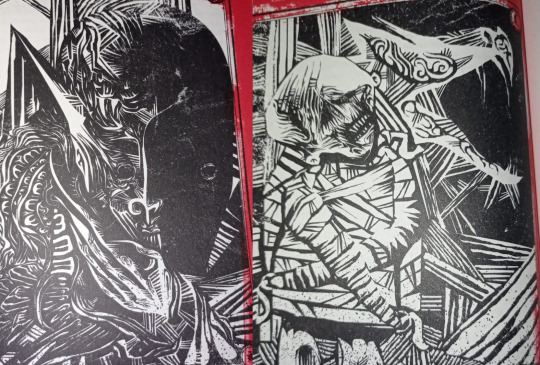
For example, the edition of Dracula I personally own comes with these really scratchy, really creepy B&W illustrations related to the story, that I can't find scanned online so I'm uploading them here so you can look at. They don't necessarily depict the scenes but rather some of the story's moments, like Van Helsing staking Lucy, Renfield in a straightjacket, Dracula as a coachman, and they are more focused on conveying the horror of the concepts at play.
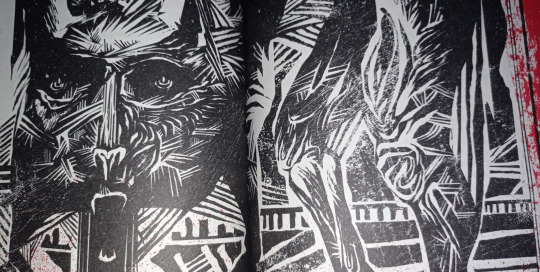
Dracula never looks the same way in any of the illustrations, in fact you kinda have to piece him out of them by trying to find teeth or capes or eyes or bat-features to see where he's hiding this time. In the first, it's the half-man half-bat, in the 2nd, he's the shrieking bat silhouette next to Renfield, and in the latter, he's the gaping jaws and eerily humanoid eyes in the wolf. The effect to me almost feels like if you were to look at a bunch of tv static and then see a humanoid shape form for a split second before everything went back to normal, something like you'd get from Slender Man or other modern creepypastas, and I’ve argued before that Dracula’s form of horror is a very modern one.

In terms of illustrations of Dracula that keep up the original traits while still pulling off horror, I definitely have to hand it to the one at the left of the image above, drawn by regourso on Deviantart (account deleted at present). Going back to Castlevania’s many takes on Dracula, two in particular that stick out to me would be Castlevania: Judgment’s armored dress Dracula, who’s got this great twisted heart/rose motif going on in his outfit, and Dracula’s final form in SOTN where he just sits in his throne and his cape twists into all these monsters, particularly how it’s depicted by witnesstheabsurd’s depiction.
I’m not particularly a fan of how Dracula’s “final form” in these games is usually just some big demon, and part of what I like about his final form in SOTN instead is that, while it’s not a particularly challenging final boss, I do find it interesting the idea of us never actually getting to see what Dracula’s true final form looks like, only an ever-shifting pitch-black torrent of teeth and claws and bloody veins pouring out because that’s ultimately what Dracula is and brings to the world.
On the flip-side of the rotten old monster, we have the charming seductor Dracula, and while I’m really not a fan of how various adaptations have convinced people that “the point” of Dracula is that he’s a seductive force and an allegory for Victorian xenophobia and I’m reeeally even less of a fan of adaptations that make Dracula some misunderstood tragic hero (and I think I’ve made rather violently clear my feelings on interpretations that play up a romance between him and Mina), that the seductive force part exists is impossible to deny, so conversely, while on one hand we can have Dracula as the gargantuan whirlwind of predatory violence, we can also go for Dracula as the tantalizing lover.

I’ve seen a lot of opinions proclaiming Frank Langella as the best Dracula because he was the best at actually being seductive while still playing Dracula, although I haven’t yet seen his performances. If I had to point at one picture I look at and do buy for a second the idea of Dracula as a romantic character, it would be that particular still of Raul Julia in the left of the above image. And it’s strange for me to think of Raul Julia as attractive because I mainly associate him with his brilliant comedy performance of M.Bison (I know it’s far from the highlight of his career but, look, I grew up with Street Fighter, I can’t help it) but those eyes are definitely looking pretty convincing to me, if nothing else.
And I’ve included this still of Sebastian Stan in the right because, during a conversation between me, @krinsbez and @jcogginsa about who could be a good fit for Dracula, jcog suggested Sebastian Stan, partially because he’s Romanian, and I’ve learned recently that Stan was actually interested in playing the character in Blumhouse’s upcoming remake. And you’d think I’d hate this idea considering how much I don’t care for tragic anti-hero Draculas, but who says that’s what he’d have to play?
Do you have any idea how much actors, who are traditionally known for heroic or supporting roles, usually LOVE it when you give them a chance to cut loose as the main villain?
I’d want Sebastian Stan to put all of his charm, all of his talent, all of his good looks and etc, into playing the absolute most vicious, bloodthirsty and irredeemable Dracula put on screen. Someone who is exceedingly, eerily good at being a lovable protagonist, who’s all smiles and charming eyes and politeness mannerisms and maybe even a funny accent, and then it isn't as funny when he's flying through your window intent on kidnapping babies to feed to his brides, except he may take a moment or two to do so because he's feeling pretty hungry himself right now.
Now, admittedly this is kind of a lot to juggle in regards to a single character, which is why my answer for questions like these inevitably has to be “depends on what I’m going for”. That being said, if I was going to try and cast someone who I think could both look the part of Dracula, as well as respectively, play “cartoon aristocrat” Dracula, “mercurial embodiment of evil” Dracula, as well as realistically be an attractive, even seductive performer who can charm viewers even as the character descends into horrible villainy, and juggle these performances even?
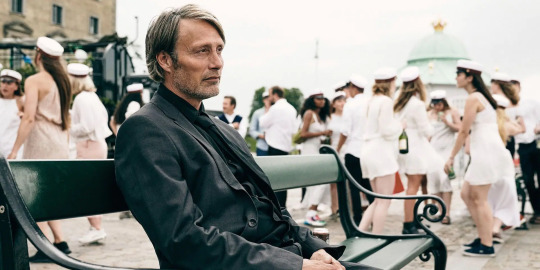
I think I’d have to go with Mads Mikkelsen. Not specifically because of Hannibal (I actually haven’t watched it yet), although it’s definitely a factor, the thing that actually made me pick him specifically is, other than his looks, his voice, his reputation for playing sinister characters, the fact that he loves the role and wants to play it, or how many people are deeply in love with this man, or that people already joke that he looks like a vampire, was watching him in Another Round, and specifically that glorious final scene where he’s just dancing to his heart’s content and just, moving with such spring in his step and such joyful vitality even though he’s past his mid-fifties, and that was the moment where, in regards to how much you all love this man, I went
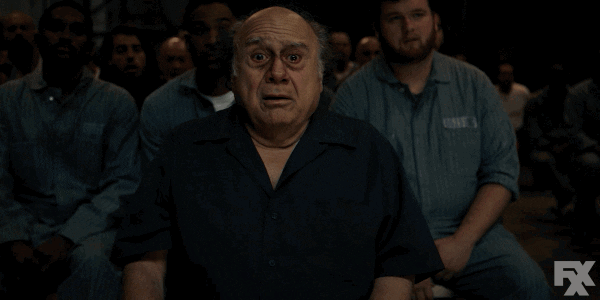
And now I am going to add “casting Mads Mikkelsen as a dancing Dracula” to The List of Reasons Why I Became a Filmmaker.
#replies tag#dracula#horror tag#bram stoker#charles dance#sebastian stan#mads mikkelsen#castlevania#raul julia#wwdits#what we do in the shadows#vladislav#nandor
311 notes
·
View notes
Text
What Went Wrong: An In-Depth Analysis of Muriel's Route
*Youtuber voice*
Below are the opinions of an uneducated individual on what could’ve left the majority of The Arcana audience dissatisfied. I will explore the plot, tropes, themes and morals of the Muriel route and try to explain what may have gone wrong. I will be treating the game as a novel since it's advertised as one.
1. Consistency. If you are unfamiliar with the chekhov's gun; it's a story writing principle that dictates each element you introduce should come into play (foreshadowing). Now let's start with a few story beats that were later abandoned or concluded in an underwhelming manner:
Muriel's blanket
Muriel's magic mark (on his back)
Forest spirit (spirits in general)
Lucio's upbringing
Circumstances of MC's death
Figurines/whittling/charms
Muriel's blanket is teased to be a tapestry, which would tie in with his later fascination with them later on, as it had been the only thing he had left from his past. MC neither sees nor comments on the blanket, we only know it exists thanks to other playthroughs and short stories.
Magic marks are an important point in the game. Every main route emphasises on how it affects the chosen LI. It's reveal is important in a way that it serves as a passage to a new act where the reader explores magic and Arcana pantheon as they are a monumental part of the overall worldbuilding. This exact point applies to the Heart of the Forest and how spirits interact with the world around them as well.
Whittling and Charm making are the only hobbies we get from Muriel's isolated life, their introduction helps the reader humanise the character by giving us a crumb of his everyday life. It's never mentioned again after the scene where MC asks him what he does. He doesn't idly whittle during their journey and charms only come to play in an offhanded reference during reversed ending.
The other two are also ignored but I will touch on Lucio later on.
Why do these matter? A few abandoned plot points don't make or break the story but on a grander level it hinders the audience investment. When we read, we like to think the details we notice will come to play eventually, we like recognizing references that were introduced earlier. I'm sure I don't need to give examples on this one, I don't think anyone will disagree.
2. Themes. Thematic influences this story utilized are all over the place, and it seems to me like it stems from the improper application of certain tropes;
The Hero's Journey
Home Sweet Home
Shell-Shocked Vet
Last of His Kind
etc.
Some of these tropes tackle themes such as;
Slavery
PTSD
Survivor's Guilt
Genocide
I'm not going to try to explain How to Write any of these topics. I'm not remotely qualified. I think it's better if I just give examples from popular media because whether you know how to write it or not, you can still understand when it's written well;
AtLA deals with genocide and survivor's guilt. It's in the name; The Last Airbender. Aang is the sole survivor of a culture he'd only had an opportunity to engage in for a handful of years. He left them with a childish tantrum and now they're gone forever. I can't think of another mainstream series that shows the gruesome reality of war and genocide better than this one.
When Muriel realizes his true heritage and loses Khamgalai is the point of the story where Luke sees his family's farm burned down, Aang goes back to the air temple, Treebeard walks in on the demolished part of the forest. (The inciting incident)
(Could also have been forest spirit’s death but it was too early in the story so I don’t consider it a missed opportunity.)
Up until this point the hero has their doubts, they're going through the motions but they are either underestimating the enemy or they're a passive protagonist. Either way, this is the point where the hero has to take the reins of the story. What purpose does this serve in Muriel's route instead? It simply validates Muriel's beliefs. He's useless, he isn't strong enough. We as the reader need a point to see where the hero takes a step to drive the story forward or whoever takes that step will steal the spotlight, it will be their story. As it is, this is the point where it ceases to be Muriel’s story.
PTSD got the worst end of the deal. Since Dragon Age fandom has a huge overlap with the Arcana I will use Fenris as an example; for those who are unfamiliar with the character, Fenris is an escaped slave. After the sex scene he vividly describes an experience that most people can easily identify as a flashback. The game never tells us that he was abused, it doesn’t show us him having a panic attack but it shows us that whatever transpired between him and the player character clearly triggered an unpleasant memory.
Arcana tries and initially succeeds to do something similar. We see that the character is untrustworthy, sensitive to touch, easily agitated, can’t sleep outside of his perceived safe environment… It introduces us the cause later on and the story has two options, each will drastically change the moral of the story:
Remember these as they will be important later on
Portray Muriel fighting as a bad thing; You can’t fight violence with violence angle or the fact that the villain’s forcing him into a situation where he’ll have to fight again makes the villain all the more intimidating.
Portray Muriel fighting as a good thing; He has the means to defeat the villain and he just needs encouragement. With great power comes great responsibility. By not fighting he willingly condemns everyone to an awful fate and that he is selfish.
I’d like to take a second to explore the 1. Option, I feel like the game may have intended to implement that idea but failed because of the implementation of Morga and choices presented for the player character: Morga is an Old-Soldier, these characters are often push the hero out of their comfort zone in an aggressive way towards complacency, they are a narrative foil to the mentor. For the first option to work the story had to show Khamgalai acting as a mentor and having the protagonists challenge Morga’s teachings(see Ozai-Iroh). As it is, Morga’s actions are never put under scrutiny (narratively) and her death feels hollow as a result. She didn’t sacrifice herself for the heroes due to her guilt, she died because she felt a moment of sympathy for her son which wasn’t explored before, she showed no intention to change nor any doubt.
It is clear the game choose 2. Option, it is a controversial choice given Muriel’s mental condition and the game is acutely aware of this, which is likely why Muriel’s PTSD will get carefully scraped from the story from here on out. (I won’t address other instances where his trauma wasn’t taken into account, I feel like this explanation should cover them as well.)
3. Morals. Every story, whether the author intends it or not, has a moral. The Villain most often acts against that moral and in turn can change the hero's perspective. Morals are not ideals; the morality of Killmonger isn’t that marginalised people should fight for their rights, it is that vengeance is just. Whether it’s right or wrong can be debated but what makes an ideal the moral of the story is in the portrayal. How the narrator depicts the events, how people around the heroes react... all are a part of portrayal.
The story choosing “Muriel fighting is a good thing” earlier puts in the foundation of a moral. The story tells us Muriel has to fight, it’s the right thing to do. He has to be brave for the people he loves.
This choice affects how his past actions will be perceived; now, him escaping the arena to save himself is cowardly, abandoning Morga is cowardly.
The story tells us it wasn’t, but shows us that it was. This is the end of the midpoint of the story, at this point we need to have a good grasp on what we should perceive as wrong or right for us to feel invested. If we zig-zag between the morals we won’t know which actions we should root for. But more than that, the conclusion will not feel cathartic as it will inevitably demonstrate the opposing ideals clashing at its climax.
Villain doesn't necessarily have to be sympathetic and Muriel's route makes no effort to make him as such, but they need to be understandable. What danger does Lucio pose to the status quo, what makes him a compelling villain? Whether he conquers Vesuvia or not doesn’t drastically affect Muriel’s way of life, he’s been in hiding for years. He doesn’t threaten to steal MC’s body, Muriel is not compelled to pick up arms to save his beloved. He wants to protect the people from going through what he’s been through, right? That is what the story wants us to think. But what has he been through? Fighting was his choice, Lucio tricked him into it. Lucio later tricked Morga, his own mother, to save his own hide. This tells us that Lucio is a manipulator, but he doesn’t manipulate his way into Vesuvia, he barges in with deus ex machina monsters. He doesn’t demonstrate his skills as a tactician by making deals with neighbouring kingdoms to get their armies. We don’t know his strengths therefore we don’t know his weaknesses. If he seems to be losing he can just conjure a giant dragon to burn everything down, we just can’t know. That is why the application of deus ex machina is highly taboo, the victories don’t feel earned and defeats feel unfair.
4. Tone. Playing with the genre is not uncommon and a game such as Arcana has many opportunities to do so. It is a romance story, everything else is the back-drop. The tone works best when its overall consistent but tonal changes act as shock for the audience to keep them engaged and keeping one tone indefinitely gets us desensitized. We can’t feel constant misery if we are not made to feel tinges of hope in between. Good examples of dramatic tonal change (that I can think of): Mulan - arriving at the decimated village, La Vita e Bella - the father’s death, M*A*S*H - death of Hawkeye’s friend. Two of these examples are mostly comedy which is why this tonal shift affects us so, it was all fun and games until we are slapped in the face with the war going on. There are no one liners in those scenes, the story takes a moment to show appropriate respect to the dead, it gives its characters time to digest and come to terms with loss. Bad examples are the majority of Marvel movies.
In Muriel’s route there’s never such a thing, Muriel has a panic attack and MC kisses him. This unintentionally tells us, the genre being romance, that the panic attack only served to further MC’s advances. It tells us that he’s never had the control of his life and it’s yet again stripped from him by the decisions of player character. This is not the only instance this happens. The story shoe-horns in multiple cuddle sessions between important plot beats. And it does the exact opposite during a moment where he is having a heart-to-heart with the person he loves by having the ghost of Morga appear to give an ominous warning/advice.
When he runs off during masquerade it’s built up to be an important plot point. Muriel will finally face his past, he’s been running away from it all along, and he will have an opportunity to be accepted back in. MC is supportive but ultimately, it’s meant to be Muriel's moment. But as I mentioned above this is not his story anymore so he’s not given any time to address his problems, instead a ghost appears to tell him what he needs to do, again. Because we need to wrap the story up, we don’t have time.
Remember how I said the 2 Options will be important later on, well here we are at the very end. Upright and reversed.
“Portray Muriel fighting as a bad thing”
This suggests that the triumph of Muriel won’t be through violence. Maybe he will outsmart Lucio in a different way, he won’t play his games anymore. This option suggests that Lucio will not be beaten by his own terms.
“Portray Muriel fighting as a good thing”
This option concludes with Muriel finally overcoming his reservations on violence and doing what's right to save the people he loves. And bringing justice to people who Lucio hurt.
If you are wondering why the upright ending feels random, this is likely why. The ending plays out as if the story was building on the 1st option while we spent chapters upon chapters playing out the 2nd one. It is unearned.
(The reversed ending, being reversed, also uses Option 1 path but in which Muriel can’t achieve his narrative conclusion)
The Coliseum is filled with people who are on their side against Lucio’s shadow goons. Because we can’t have people being on Lucio’s side without addressing the duality of human nature, even though it’s an important part of Muriel’s story. The people who watched and enjoyed Lucio’s bloodsport are no more, they are all new and enlightened offscreen. We completely skipped the part where Vesuvia comes to terms with its own complacency and Muriel simply feels at ease because the crowd is cheering on him now. This is what happens when you give the character a chance to challenge those who have been complicit in his abuse (masquerade scene) and completely skip it to move the story along.
Muriel doesn't get justice, ever. The people only love him now because he's fighting for them instead of his own survival. Morga or her clan doesn't answer for the massacre of Kokhuri, Vesuvia doesn't answer for the sick entertainment they indulged in and Lucio doesn't answer for Muriel's enslavement. It is not even acknowledged, nowhere in the story (except the very end of reversed ending, and even then it almost gets him killed so its clearly the wrong thing to do on his part) is a choice presented where Muriel has an opportunity to get any sort of compensation where he instead chooses to move on.
I don’t intend to straw man anyone but this is a sentiment I’ve seen a lot; “It’s a short story, a dating-sim, what do you expect?”
I expect nothing, I’m simply explaining why some people feel how they feel. It is a short dating-sim but it seems to me like it was aiming to be something more by borrowing elements that were clearly far above their weight range to tease something more and under deliver. It is okay to feel content with the story, and it’s okay to feel let down. If we had a unanimous decision on literature we would never be inclined to write our own stories.
504 notes
·
View notes
Text
Episode Review: ‘Together Again’ (Distant Lands, Ep. 3)
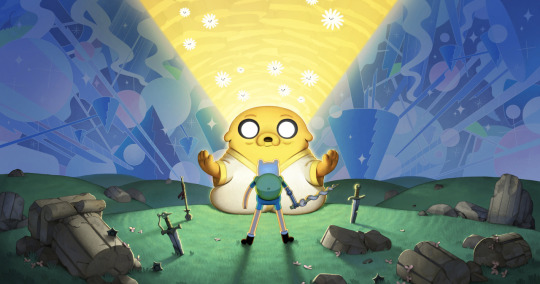
Airdate: May 20, 2021
Story by: Jack Pendarvis, Kate Tsang, Hanna K. Nyström, Christina Catucci, Jesse Moynihan, Adam Muto
Storyboarded by: Hanna K. Nyström, Anna Syvertsson, Iggy Craig, Maya Petersen, Serena Wu
Directed by: Miki Brewster (supervising), Sandra Lee (art)
Across Adventure Time’s ten season run, the show explored a bevy of “mature” themes and story ideas—topics, like love, sexuality, depression, and grieving. The show also touched upon death, but the emphasis was usually placed on the emotional toll of a loved one dying, not really what happens when you die. We knew there were Dead Worlds and Death. We knew that there was reincarnation. But how does it all fit together? What does it mean? How does it work?
With “Together Again,” we finally have many of the answers.
This special opens with a marvelous fake-out episode simply called “Finn & Jake,” that sees the two steal a magical cartoon of 50-flavor ice cream before rescuing Turtle Princess and LSP from the clutches of the villainous Ice King. This is all deliberately anachronistic and over the top. Ice King is back to his season one ways, Finn has both arms, and he is still wielding his golden sword that he lost in season two’s “The Real You.” There’s lolrandom dialogue and silly monsters; it’s like a parody of seasons 1-2. But then, this adventure starts to get all wonky, and in time Finn realizes that he is in a some sort of trance or illusion: one that ends with Jake being buried in the ground. Suddenly, Finn awakens from his reverie. He’s an old man. And he’s dead. We’re then presented with a new title card that lets us know the episode is actually called “Finn & Jake Are Dead.”
Holy Glob! They actually went there.
Turns out Jake died years before Finn, so naturally Finn is super excited to see his best bud. But something’s wrong—he cannot find Jake!! They planned to spend eternity together. But all that Finn can find is his very own psychopomp, Mr. Fox (voiced by Tom Herpich, whose purposefully stilted line readings are the epitome of delightful). Finn rightfully assumes that Jake is in a different Dead World, and so, being the ball of spunk and energy that he is, he demands to meet with Death, only to discover that there’s a New Death in town (voiced by Chris Fleming). The episode eventually explains that New Death was the son of Death and Life, and after New Death killed his father, he became the sovereign of the afterlife. New Death hates his job and decides to just blow up all the Dead Worlds so he doesn’t have to deal with it all. (I won’t get too much into the details here, because there would be a lot of story to parse out.)
Finn soon learns that Jake has reached nirvana in the 50th Dead World, where there is nothing but peace and serenity. Finn nevertheless tracks down Jake, pulls him from paradise, but in doing so, accidentally lets New Death in, who promptly obliterates Elysium, sending all the enlightened souls—including those from different levels of the afterlife—to the 1st Dead World. This gronks up the afterlife, temporarily halting the reincarnation process.
Well, Finn and Jake are rightfully ticked, and so they haunt the material plane looking for Princess Bubblegum. She’s not home (more on that later), but Peppermint Butler is! After Ghost Finn and Ghost Jake explain the situation, Peppermint Butler tells them what to do: They need to find Life and explain the situation. The duo manage just that, and Life is rightfully angry that her kid has stopped the transmigration of souls. After Life gives Finn a McGuffin sword that can hurt Death, Finn and Jake return to his abode. A brawl ensues wherein we learn that New Death has been possessed… by none other than that spirit of the Lich.
That’s right, it’s the Lich! He’s back, and boy is he evil.
The Lich explains that by possessing Death, he can destroy the afterlife, thereby destroying a key aspect of reality. Naturally, Finn and Jake are not cool with this, and they engage in combat. After Mr. Fox grabs the McGuffin sword and uses it to annihilate the Lich and New Death, he is proclaimed the New New Death and sets everything right. Finn is slated to be reincarnated, and Jake is slated to return to the 50th Dead World where he and Finn will one day be reunited. As Finn is pulled into the wheel of souls, Jake suddenly decides to go back with Finn, too, “Just for fun.” The episode ends with a card letting us know that the episode is neither called “Finn & Jake” nor “Finn & Jake Are Dead.” Instead, it is “Finn and Jake Are Together Again.”
As they say, “And there wasn’t a dry eye in the place.”
If you were to tell me several years ago that the last episode to star Finn and Jake would revolve around them dying, I think I would’ve been upset. Not simply sad, but rather frustrated because “they all died” can feel like a cheap ending. But with “Together Again,” it all works. And a large reason that it works is because the show goes all in with their ideas. Finn and Jake don’t magically leap back into their old life (no, no, they very much do bite the dust). Instead, the special emphasizes the cyclical nature of life through the transmigration of souls. The episode ends with a beautiful scene of Finn and Jake, bound together as soul-brothers, being reborn into a new, mysterious (possibly Ooo 1000+?) world. It’s both aesthetically and emotionally pleasing; it doesn’t feel off the way over finales might. This is right. This is the way life works. “Round and round as nature goes,” and all that jazz.
I loved the series explanation of how death works. It seems that souls land in a specific Dead World, where they ‘marinate’ for a bit, presumably being rewarded or punished based on their life in our meat reality. After a time, they are then reborn. This process repeats, with each soul reaching higher and higher levels of enlightenment until they hit nirvana, which is the 50th Dead World. So in a sense, Adventure Time has a roughly Buddhist cosmology with a dash of Greco-Roman mythos thrown in for flavor. (As to what happens after a soul stays in the 50th Dead World for a long period is anyone’s guess, but I’d speculate that when all the souls in the multiverse have been purified and land in the 50th Dead World, they will all collapse into one another and form one perfect Monad. Perhaps this is the sphere of perfection that the beings who merged into Matthew thought they were connecting to? Who knows! It’s anyone’s guess!) I was a little disappointed that we didn’t get to see who Death, Prismo, Life, etc.’s boss was, but perhaps that’s a mystery better left up to the imagination!
One minor thing that I loved about this special was the number of characters who made cameos as well as all the callbacks that were made to previous episodes. Regarding the former: Finn and Jake’s canine family show up (including the oft-forgotten Jermaine!), as do Tree Trunks and her myriad husbands. Tiffany plays a major role in all these shenanigans as a “death cop” of all things. There is a delightful rogues gallery stuck in the 1st Dead World (including, among others, Maja, Sharon from “The Gut Grinder,” and Wyatt). In the 50th we find Ghost Princess and Clarence happily at peace next to Booshy, the weird spirit mentioned in the Pen Ward classic “High Strangeness.” As far as callbacks go, perhaps my favorite is the clap (from “James Baxter the Horse”) that Jake taught to Finn in case they ever do get separated in the afterlife. And of course, there are myriad references made to “Death in Bloom,” the episode that planted the seed for what this would grow into.
Going into the special suspecting that it would involve Death, I was curious how they were going to handle Miguel Ferrer’s character. (In case a reader is not aware, Ferrer played Death in episodes like “Death in Bloom” and “Betty,” but he sadly passed away a few years ago). The producers’ choice to feature him in a non-speaking cameo—despite playing a relatively significant role in the story—was wise; I’m not sure if I can articulate the exact reasons, but something about his role felt appropriate and not gross, as some post-mortem memorials can be. Speaking of which, the wonderful, lovely Polly Lou Livingston was featured for the last time in this episode as Tree Trunks, happily in heaven with her literal harem of husbands. It was funny, it really was, and I’m sure that Polly Lou would’ve gotten a kick out of seeing it on screen. (Also, this is a pro-Tree Trunks safe space. Any Tree Trunks haters will be chucked into the 1st Dead World with Wyatt.)
The biggest mystery in this whole thing, for me at least, is the question of Princess Bubblegum and Marceline. Several years ago, I wrote an essay about what could’ve happened to them in the Ooo 1000+ universe. I speculated that they peaced out and left Ooo behind. In this special, neither Bubblegum nor Marceline are to be found in the Candy Kingdom—Peppermint Butler seems to be the one in charge, given that he is now wearing Bubblegum’s crown. Likewise, the duo aren’t anywhere in the Dead Worlds either. Maybe the two of them skipped town and got a duplex in the Nightosphere? Who knows… I just want my favorite gals to be OK!
All things considered, “Together Again” was a marvel: An episode that managed to feel like a series finale even more than “Come Along with Me” already did without taking away from the series itself. An episode that managed to make the idea of dying funny. An episode that brought back the Lich in a way that wasn’t forced. An episode that made Mr. Fox the New New Death. An episode that gave us a beautiful ending to Finn and Jake’s story… as well as the beautiful beginning to a new one. I said it on Twitter, and I’ll say it again here: “Together Again” was the end of a sentence in a book with infinite pages. Truly, the fun will never end.
Mushroom War evidence: Everything takes place in the Dead Worlds, so not really. Perhaps a more eagle-eyed viewer can inform us...
Final Grade: That’s right, I’m gonna do it...

Post-script, I actually messaged Jesse Moynihan to ask about his writing credit. He told me that it was for an unused story idea that he had developed. I’m not certain, but I’ll bet it was a part of the cancelled TV movie they were trying to make during season 5, since that would’ve seen Finn and Orgalorg journey to the various Dead Worlds.
#adventure time#adventuretime#atimers#at#atdl#distant lands#adventure time distant lands#finn the human#jake the dog#together again#togetheragain#dead worlds#hanna k. nyström#Hanna K#adam muto#jack pendarvis
246 notes
·
View notes
Text
THE BOX IS NABOO
That’s it, I’m doing it, I’m writing that stupid meta I’ve had in the works for two and a half years, I’m sharing it with the world. I promised it for last Thursday, my poll was forever ago, but whatever! I’m writing that freaking thing.
(super duper long post, press j to skip)
Enter my rabbit hole.
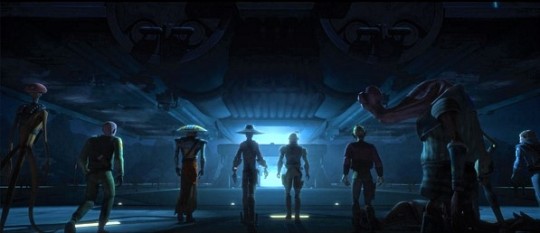
First thing to establish: the Box makes no sense whatsoever in-universe.
((EDIT: Something I forgot to mention. IRL, the premise of a giant murder cube and the aesthetic - wall patterns, light designs, etc - of the episode come from the 1997 horror movie Cube, (see the episode’s wookieepedia page). However, while the two are very closely linked visually, the Box does not follow the movie structurally or narratively, as you can verify by simply reading the movie’s summary.))
Recap of the context for the "Box" episode (s4e17): Palpatine is planning his own kidnapping. It was never meant to succeed, and while the plan would obviously benefit him (making the Jedi look bad, pushing Anakin closer to the Dark Side, making Republic citizens more afraid -> more docile, etc...) his actual goal is never explained, and it’s weird that he’d go to such extreme lengths for results so minimal that we’re never told what they are.
So Palpatine asks Dooku to kidnap him at the Festival of Lights on Naboo. Dooku hires Moralo Eval to design a giant box-thingy to test bounty hunters to hire the best of them to kidnap Palpatine. Moralo then gets arrested to alert the Republic that something is afoot, and hires Cad Bane to break him out. Obi-Wan - undercover to learn Moralo’s plan - goes with them. They evade capture and go to Serenno, and Bane and Obi-Wan have to pass the box-thingy test. The level of brainkarked logic here... Truly on par with Megamind, Gru and Heinz Doofenshmirtz.
Setting aside the insane plot holes and utterly nonsensical behavior of the villains, the Box itself is moronic from a plot perspective. It’s insanely complex, obviously incredibly expensive and would have taken months (more like years but it’s a short war) to make when it’s not even needed for the dastardly plot! Just hire some guys who have already proven themselves against Jedi! Throw cash at Bane and Embo and a few others! Maybe attack them with your saber and see how they do!
And after all that, Dooku still ends up trying to kidnap Palpatine on his own. I can’t even...
So why does the Box exist? Well, apart from being a nerdy callback to Cube, giving us a good thrill and being generally awesome to look at, it has actual narrative purpose within the SW universe.
The box is Naboo.
What the Box lacks in plot relevance, it makes up for with its heavily symbolic meaning. It very closely follows Obi-Wan and Qui-Gon’s experiences on Naboo - but only certain parts, which I’ll explain later.
We start with clean, sterile environments, SW’s favored way of showing villainy.
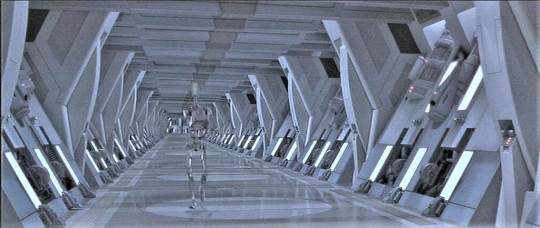

Then we have the protagonists locked in a room as dioxis, a poison gas, pours in.
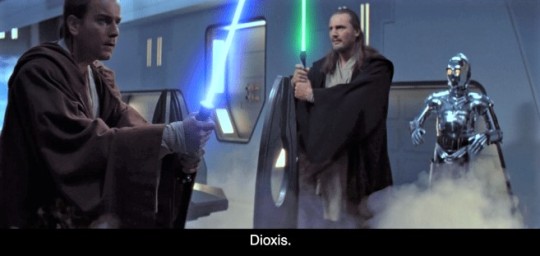
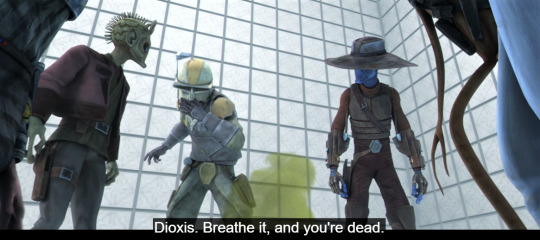
And then they escape... this way.
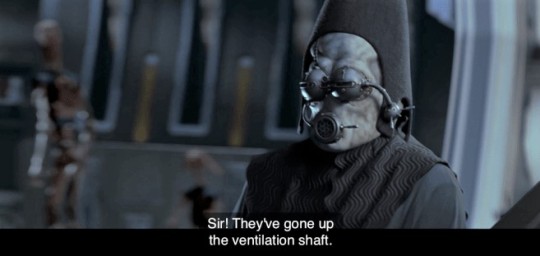

(Okay, here the shaft is down, not up. And it’s not a ventilation shaft per say, it’s the designed escape route. Same difference).
We then skip most of TPM (namely, Obi-Wan and Qui-Gon discovering the droid army, finding Padmé, leaving Naboo, landing on Tatooine, going to Coruscant, etc, etc) to come back to Naboo and go directly to the lightsabers and catwalks.
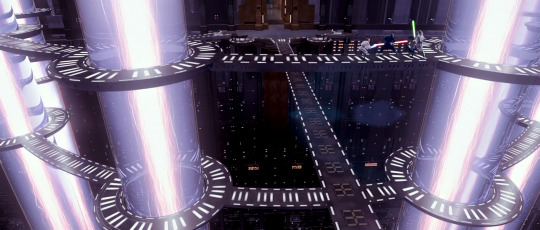

(Note: in both scenes, Obi-Wan has to propel himself from a catwalk.)
In TPM and TCW, the catwalks are immediately followed by ray shields
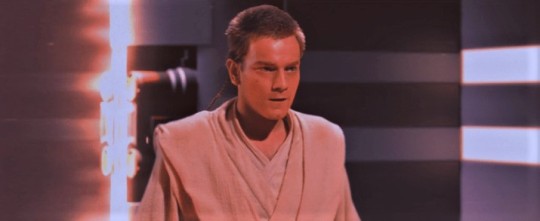
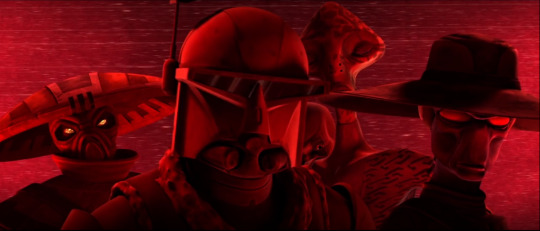
And we finally end with the last scenes. Now, they don’t look the same but they are structurally identical.
Obi-Wan is faced with a challenge unsuited for his abilities (facing Darth Maul // shooting three moving targets when he’s far more skilled with a blade than a blaster) on a narrow space above a melting pit/pit of fire.
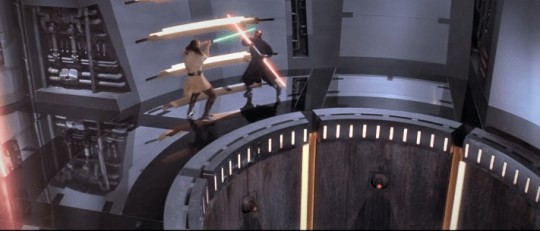
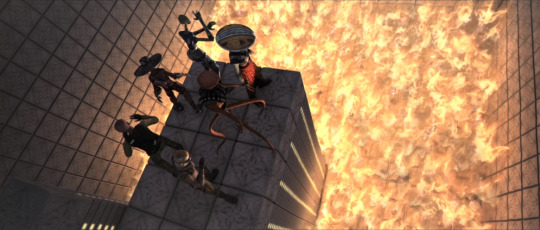
He first watches someone die failing to complete the task...

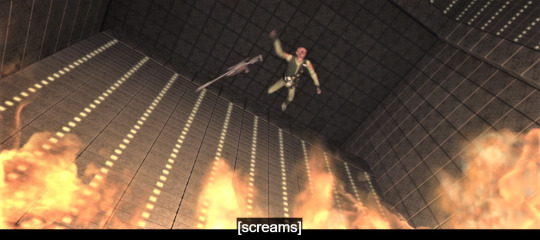
... and has to do it himself, faring much better than expected (holding his own against Maul // shooting all the targets easily).
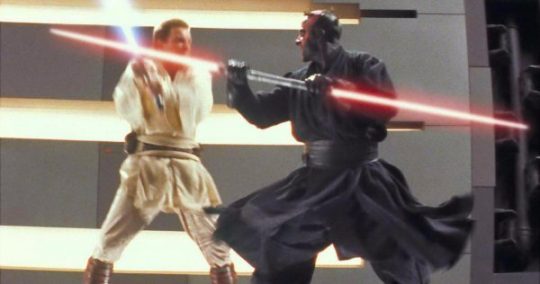
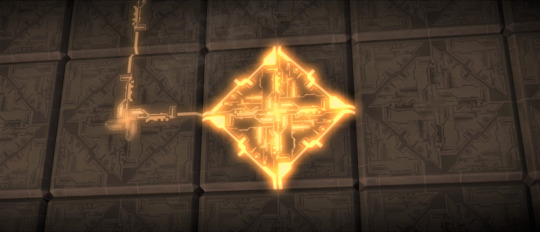
He then almost falls to his death and gets saved unexpectedly.
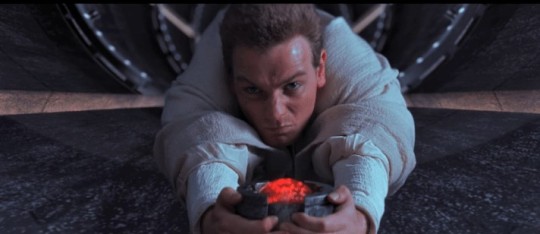
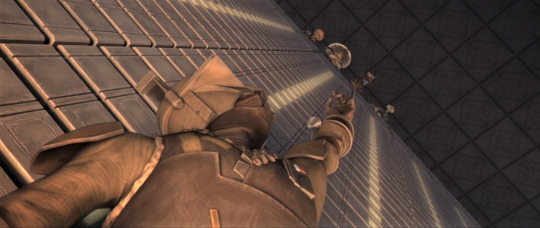
And then there’s the final showdown.
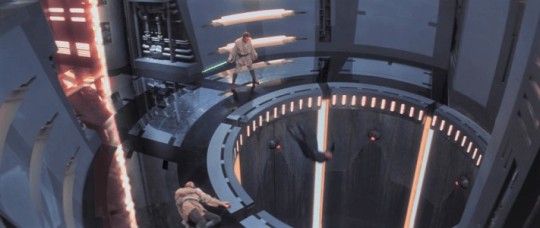
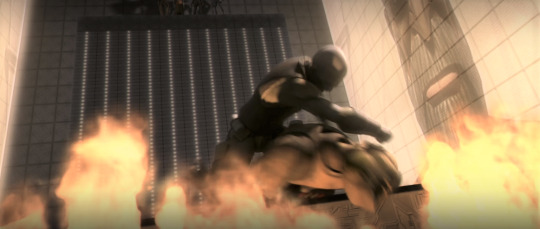
In both scenes, Obi-Wan is angry. And in TCW Dooku eggs him on, banking on his anger. (More on that later.) In both cases though, he centers himself and is able to overcome both his opponent and his own unbalance. But in TCW, he doesn’t go for the kill, because he doesn’t need to.
The Box, as a literal character-explorator ex-machina, thus shows us Obi-Wan’s growth.
In TPM, Obi-Wan follows Qui-Gon’s lead. In TCW, he is the leader. He identifies the gas, makes the plans. He doesn’t fall from catwalks anymore - he runs atop moving ones. He doesn’t stay stuck behind ray-shields, he finds the solution. (Btw, how did Moralo know what blood type Derrown the Exterminator was? There was a 50% chance of him dying - thus killing all of the bounty hunters. Was that an acceptable outcome? TCW I need answers!) He doesn’t slay his foes, because he’s become powerful enough, skilled enough and wise enough to survive (and win) without needing to kill.
He’s grown - and, even more interestingly, he’s also stayed the same. In the previous episodes, we see some of the dark aspects of Obi-Wan. How he - like all Force-wielders, all people - could lose himself if he stopped maintaining absolute control.

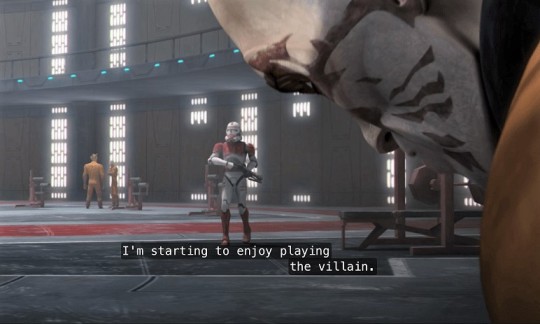

But in the Box, surrounded by the worst criminals of the Galaxy, the most ruthless, worthless people, he’s still kind and tries his best to keep them alive.


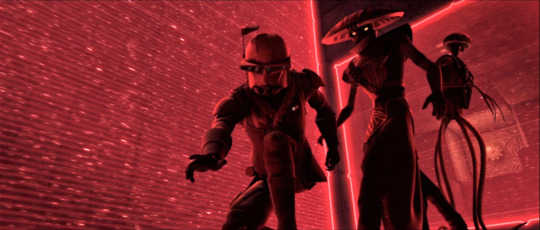
The Box is a reminder and a reassurance for the audience that Obi-Wan Kenobi is still there under Rako’s face. He hasn’t lost his compassion, his restrain. He’s still a Jedi. And he’s an awesome, badass one.
And now, for what it tells us about Dooku!
It’s much shorter, don’t worry. Basically, Dooku considers that the best way to pick “the best of the best” of the deadliest people in the Galaxy is making them go through what killed his Padawan. There, I’ve broken your hearts, you’re welcome.
More seriously, Dooku is a manipulative ass. It’s pretty clear that he knows Rako is Obi-Wan, or at the very least suspects it.
He has an interesting reaction upon learning Rako’s identity, he keeps praising him despite his usual distaste for low-lifes, he smirks secretively after Eval says “I’ll show you who’s weak” (not included there because it’s a close-up of Dooku’s lips and no one wants to see that) and he tells Rako he’s very disappointed when he doesn’t finish off Eval.
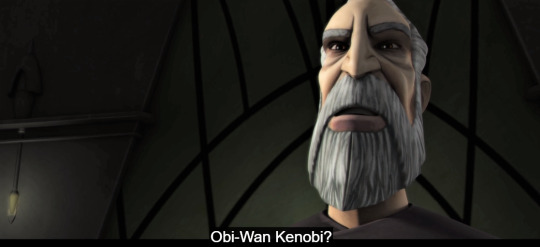
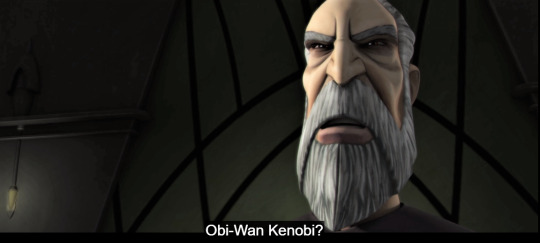
[Later]
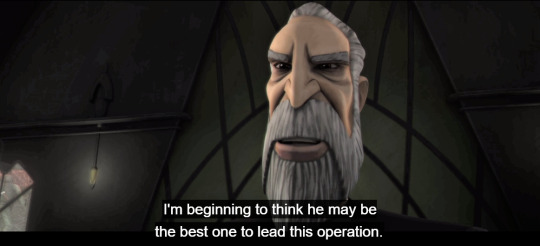
(Look at this smug asshole - I can’t. YOUR GRANDSON IS THE BEST, WE KNOW, STOP ACTIVELY RUINING HIS LIFE ALREADY.)
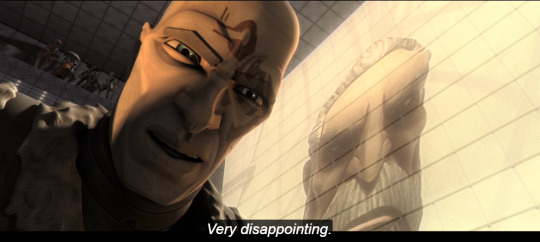
(Dooku... why...)
Now obviously Dooku couldn’t have made the Box specifically for Obi-Wan, because it would have to have been designed months before the Council ever decided to send Obi-Wan undercover, but he has no qualms trying to use it to push Obi-Wan to the Dark Side. Ffs Dooku, making your spiritual grandson relive one of the most traumatic events of his life on the off chance that he’ll join you (and desecrate his Master’s memory in doing so) is not okay!
Final tidbits of analysis: I mentioned that not all of TPM is mirrored in the Box. What’s omitted is the droids (even though Obi-Wan and Qui-Gon fight B1′s and droidekas between the dioxis and the ventilation shafts) and anything pertaining to Sidious (all the political stuff on Coruscant). You’ll also note that the fake lightsabers are orange.
=> The Box distances itself from anything that connects Dooku to Naboo. Red lightsabers are the trademark of the Sith, so they’re not used. The bounty hunters will be facing Jedi, so logically the fake sabers should be green or blue - and yet they’re orange, the color closest to red without being red. It fits with Dooku’s special brand of dishonesty - he always tells bits of the real story but twists them just enough to absolve himself of any fault and to justify his choices.
(”We can destroy the Sith” -> could maybe destroy Sidious with Obi-Wan, but fails to mention he’s a Sith Lord himself; “the Viceroy came to me for help, that’s why I’m attacking the Republic” -> political idealism is a small part of it, but fails to mention he’s Sidious’ underling and is playing the Viceroy like a fiddle; “Qui-Gon would have joined me” -> maybe, still fails to mention he’s working for the man who ordered Qui-Gon’s death; “I told you everything you needed to know” -> debatable, never said that Palps was Sidious; “Sifo-Dyas understood, that’s why he helped me” -> partly true, doesn’t admit to killing Sifo-Dyas right after getting his help)
So we have a twisted version of Naboo, droid-free (as droids are now irrevocably associated with Dooku, even if that wasn’t the case in TPM) and with sabers that aren’t quite red. Keep in mind that Dooku had already fallen by TPM. (We know this because he killed Sifo-Dyas and created the Clone Army - part of Sidious’ plan - when Valorum was still Chancellor, as per the episode The Lost One.) That means Dooku was (in)directly complicit in Qui-Gon’s death. And the Box doesn’t (=refuses to?) acknowledge that.
(Also omitted in the Box are the Gungans and Tatooine. It makes sense, because Dooku probably wouldn’t have the full details regarding those parts of Qui-Gon and Obi-Wan’s missio as they weren’t as public, and would see them as irrelevant if he did. He utterly despises Anakin, and Gungans are the type of people he always dismisses out of hand).
Anyway, that’s my two cents about the Box. To quote Lucas...
“It’s like poetry. It rhymes.”
Thanks to @lethebantroubadour @impossiblybluebox @nonbinarywithaknife @ytoz and @kaitie85386 for voting for this one. Next up is a compilation of the Jedi being casually tactile with each other (because they’re a warm and affectionate culture, dammit).
Also thanks to @laciefuyu for giving me gifs I ended up not using ^^; you rock anyway!
#meta#my meta#the box#deception arc#rako hardeen#rako hardeen arc#naboo#obi-wan kenobi#count dooku#cad bane#moralo eval#darth sidious
1K notes
·
View notes
Note
I don't think GRRM explores the flaws in Arya's characterisation rather he explores how the world is unfair to her. Whenever I read Jon, Sansa, Dany , Robb and Bran, I feel they behave as their age requires them to be. They show capabilities yet are not exempted from bad choices which a character at their age can easily commit. With Arya, sometimes it feels like I am not reading a 11 year old kid but a grown up 25 year old woman who never messes up things or has any characterisation flaws which are not inherent within like the other child characters but those failings are primarily influenced by the society.
Hello Anon,
I have to agree and disagree with you.
I agree with that Martin writes Jon, Sansa and Dany better- MUCH BETTER.
I am obviously not a Daenerys fan but I enjoyed her character more than I did with Arya. I said it many times but I am going to say it again: Daenerys is the best written character in the series. She is much more interesting villain than man-pain Tyrion [looking at you Martin.. really, Tyrion?].
Objectively I find her character well written and interesting. But my problem with her is that her cult like fans who completely ignore her true position and characterization in the books. Hopefully in the future people will enjoy Dany character for the right reasons.
I felt like I need to explain my thoughts about Dany first to show my problems with the way of Arya was written by the author.
Arya is the WORST written main character. TRULY. Everything about her is so FAKE/FORCED/CLICHE/UNREALISTIC…
Author says that Arya is the underdog/outcast of the family. Does the writing show this?
NO!
She is literally her father's favorite child. We see Ned constantly favoring her, letting her do what she likes, he never scolds her, he makes time to talk with her about her traumas like losing a friend, he fcking finds a Water Dancer for her [but not a harp teacher for Sansa]. I have a great dad but jeez, even he never showed me this kind of devotion.
Catelyn seems like she knows her daughter well… we don’t see her abusing or ignoring her. She even acknowledges her struggles.
Her siblings love her. Even Sansa tries to keep include her into her own circle to enjoy things together, she covers for her against Septa Mordane.
As we can see, she seems doing fine as a tomboy girl in the family of 5 men/boys and 2 women/girls.
BUT SHE COULDN’T SEW SO SHE WAS BEING ABUSED.
Really? Wow she must be the only special snowflake who wasn’t good at sewing. I am sure rest of the girls in North were all experts. Arya is the only one who lacks some skill people and it made her super sad.
Fans tried to paint this as some "omg anti-feminism/sexism in society" thing and it feels absurd because Arya was bad at history and heraldy too..
A tomboy is not good at some female-coded skill is so fcking cliche for character building and I am not buying it. And this is BAD/LAZY WRITING.
Did Martin try to make her look like an underdog with this??
Well Sansa is not good at math? I am sure she had bad days because of this too but we didn’t read it. If you ask me Sansa (girly girl) being bad at math (male-coded subject) was more sexist than sewing and Arya thing [considering Sansa was good at music and playing instruments which require math but whatever.]
Arya is an outcast because she is not like other girls… WOW, it has never been written before, how did George come up with this idea? Meanwhile we have girls like Mormont girls so obviously she is not the only "NOT LIKE OTHER GIRLS MARY SUE".
Evil Mordane bullied poor Arya. Mordane is totally not good for her BUT Arya literally never listens HER TEACHER. I am not talking about her lack of skill in sewing. Arya simply NEVER listens anyone. She disobeys her septa, she declines QUEEN’s invitations rudely, she talks sh*t about CROWN PRINCE while princess is next to them.
Girly lessons like sewing weren’t the only lessons she was not into it…
Sansa would have known who he was, and the fat one too, but Arya had never taken much interest in titles and sigils. Whenever Septa Mordane had gone on about the history of this house and that house, she was inclined to drift and dream and wonder when the lesson would be done.
[ACOK; Arya VII]
She simply never cares about any lessons and she simply refuses to learn basic DECORUM. Yeah I am sorry that she had to learn things she didn’t want to but welcome to real world.
MY POINT IS: all these are so weak points to make her look like an outcast/underdog.
Don’t even let me start with Jeyne Poole calling her HORSERACE nonsense. I said it before so I repeat it: This feels so forced in the story considering Arya is the daughter of Warden of the North and Jeyne is some simple daughter of a simple man who works for Starks.
This is what author himself says about class system:
Q: What was the hardest thing in writing about such an alien world?
GRRM: The vast majority of fantasy is middle agey time wise, and he himself finds the period fascinating; glad to adopt it for novel writing - likes knights and castles and such. He objects to bad fantasy practice which adopts a time setting without accepting the culture - imposing 20th century values like the cheeky stableboy telling off the princess (in reality cheeky stableboy would lose his tongue - look what happend to Mycah); the class system was not just and ornament and these people truly belived in blood, and the rank and priviledge that came with "good" blood. [2006]
But Jeyne somehow had no fear when she was “bullying” a princess. Does this make sense to you or does it feel forced to make Arya look like a victim. And this bad writing keeps repeating itself while author writes Arya and when you realize this pattern you can’t unsee it and it ruins the books a little.
I wrote all these to explain what is ACTUALLY wrong with Arya as a character. I don’t blame Arya for the bad writing, I blame the author.
And I disagree with you a little when you said: "With Arya, sometimes it feels like I am not reading a 11 year old kid but a grown up 25 year old woman who never messes up things or has any characterisation flaws which are not inherent within like the other child characters but those failings are primarily influenced by the society.”
[I explained the her failings in society’s eyes part already.. that thing is a cliche and unrealistic writing]
I don’t agree with that reading Arya feels like reading an older woman. No it feels like reading a VERY UNREALISTIC AND DISTURBING CHILD. She totally makes mistakes:
Talking bad about prince in a room full of people, declining Queen’s invitations, not listening her septa and Sansa, making prince angry, hiding for 4 days while she should have gone to her father to deal with the mess so maybe Mycah and Lady wouldn’t be dead, attacking her sister, killing a stableboy, killing many other people, joining a assassin cult, killing a Black brother because she thinks she has the right etc..
She makes mistakes but we didn’t see her face any consequences. Will we see her face them?? When it comes to Arya I don’t trust GRRM. GRRM covers for her all the time. GRRM = Ned Stark. He favors her. I mean look at this:
Sansa saves Dontos who later molests her and he works for Baeslish who also molests her.
Arya saves Jaqen H’ghar and he turns out to be a Faceless Man who kills THREE people for her.
Sandor sexually assaults Sansa but not Arya [I am not saying he should!! But why is it always Sansa? Does the author punish Sansa for her beauty… ANSWER IS YES because I am done!]
Sansa trusts Joffrey and Cersei ends up the most hated character in the books [even author says she had a part in her father’s death and he is ok with fans hating her]
Meanwhile Arya’s spider senses tell her to not trust Roose Bolton or anyone etc.
Arya runs into people like Yoren or Harwin meanwhile Sansa… you got it.
Basically this is a simple case of author favoring a character and it happens in all books.
The only thing that indicates author knows she is not perfect is that him calling her a “psycho” or not disagreeing when fans call her a psycho [I know I usually make fun of this but actually this is not some good take about a child character especially if you say Starks- including Arya- are the heroes]
In conclusion: I think she is written terribly, she is the weakest part in the story and character building. I simply hate the way author deals with her character. I think she is not interesting. She turned out to be a very dark and disturbing child character and I have no idea what is GRRM trying to tell with her.
Thanks for the ask. Have a nice day.
148 notes
·
View notes
Note
Hi! Loving your meta on suibian :)) Just wondering what were your frustrations with cql, especially considered you've watched this in multiple mediums? (I've only watched cql)
Hi anon! thank you so much!
Oh boy, you’ve unlocked a boatload of hidden dialogue, are you ready?? :D (buckle up it’s oof. Extremely Long)
@hunxi-guilai please consider this my official pitch for why I think the novel is worth reading, if only so you can enjoy the audio drama more fully. ;)
a few things before I get into it:
I don’t want to make this a 100% negative post because I really do love CQL so much! So I’m going to make it two parts: the changes that frustrated me the most and the changes I loved the most re: CQL vs novel. (again, don’t really know anything about donghua or manhua sorry!!) Sound good? :D
this will contain spoilers for the entirety of CQL and the novel. just like. All of it.
talking about the value of changes in CQL is difficult because I personally don’t know what changes were made for creative reasons and what changes were made for censorship reasons. I don’t think it’s entirely fair to evaluate the narrative worth of certain changes when I don’t know what their limitations were. It’s not just a matter of “gay content was censored”; China also has certain censorship restrictions on the portrayal of the undead, among other things. I, unfortunately, am not familiar enough with the ins and outs of Chinese censorship to be able to tell anyone with certainty what was and wasn’t changed for what reason. So I guess just, take whatever my opinions are with a grain of salt! I will largely avoid addressing issues related to how explicitly romantic wangxian is, for obvious reasons.
OKAY. In order to impose some kind of control on how much time I spend on this, I’m going to limit myself to four explicated points in each category, best/worst. Please remember that I change my opinions constantly, so these are just like. the top contenders at this specific point in my life. Starting with the worst so we can end on a positive note!
Henceforth, the novel is MDZS, CQL is CQL.
CQL’s worst crimes, according to cyan:
1. Polarizing Wei Wuxian and Jin Guangyao on the moral spectrum
I’ve heard rumors that this was a censorship issue, but I have never been able to confirm or deny it, so. Again, grain of salt.
The way that CQL reframed Wei Wuxian and Jin Guangyao’s character arcs drives me up the wall because I think it does a huge disservice to both of them and the overarching themes of the story. Jin Guangyao is shown to be responsible for pretty much all the tragedy post-Sunshot, which absolves Wei Wuxian of all possible wrongdoing and flattens Jin Guangyao into a much less interesting villain.
What I find so interesting about MDZS is how much it emphasizes the role of external forces and situations in determining a person’s fate: that being “good” or “righteous” at heart is simply not enough. You can do everything with all the best intentions and still do harm, still fail, still lose everything. Even “right” choices can have terrible consequences. Everyone starts out innocent. “In this world, everyone starts without grievances, but there is always someone who takes the first blow.”
It matters that Wei Wuxian is the one who loses control and kills Jin Zixuan, that his choices (no matter how impossible and terrible the situation) had consequences because the whole point is that even good people can be forced into corners where they do terrible things. Being good isn’t enough. You can do everything right, make every impossible choice, and fail. You can do the right thing and be punished for it. Maybe you did the right thing, but others suffer for your actions. Is that still the right thing? Is it your fault? Is it? By absolving Wei Wuxian of any conceivable blame, it really changes the narrative conclusion. In MDZS, even the best people can do incomprehensible harm when backed into corners, and the audience is asked to evaluate those actions with nuance. Is a criminal fully culpable for the harm they do when their external circumstances forced them into situations where they felt like they had no good choices left?
Personally, I feel like the novel asks you to forgive Wei Wuxian his wrongs, and, in paralleling him with Jin Guangyao, shows how easily they could have been one another. Both of them are extraordinarily talented sons of commoners; the difference lies in what opportunities they were given as they were growing up and how they choose to react to grievances. Wei Wuxian is adopted early on into the head family of a prominent sect and treated (more or less—not going to get into it) like a son. Jin Guangyao begs, borrows, steals, kills for every scrap of prestige and honor he gets and understands that his position in life is, at all points, extraordinarily unstable. Wei Wuxian doesn’t take his grievances to heart, but Jin Guangyao does.
To be clear, I don’t think the novel places a moral value on holding grudges, if that makes sense. I think MDZS only indicates that acts of vengeance always lead to more bloodshed—that the only escape is to lay down your arms, no matter how bitter the taste. Wei Wuxian was horribly wronged in many ways, and I don’t think I would fault him for wanting revenge or holding onto his anger—but I do think it’s clear that if he did, it would destroy him. It destroys Jin Guangyao, after all.
(It also destroys Xue Yang, and I think the parallel actually also extends to him. Yi City, to me, is a very interesting microcosm of a lot of broader themes in MDZS, and I have a lot of Thoughts on Xue Yang and equivalent justice, etc. etc. but. Thoughts for another time.)
Wei Wuxian is granted a happy ending not because he is Good, but because public opinion has changed, because there’s a new scapegoat, because he is protected by someone in power, because he lets go of the past, and because the children see him for who he is. I really do think that the reason MDZS and CQL have a hopeful ending as opposed to a bleak one hinges on the juniors. We are shown very clearly throughout the story how easily and quickly the tide of public opinion turns. The reason we don’t fear that it’s going to happen to Wei Wuxian again (or any other surviving character we love) is, I think, because the juniors, who don’t lose their childhoods to war, have the capacity to see past their parents’ prejudices and evaluate the actions of the people in front of them without having their opinions clouded by intense trauma and fear. They are forged out of love, not fire.
In CQL however, it emphasizes that Wei Wuxian is Fundamentally Good and did No Wrong Ever, so he deserves his happy ending, while Jin Guangyao is Fundamentally Bad and Responsible For Everything, so he got what was coming to him (even if we feel bad for him maybe). That’s not nearly as interesting or meaningful.
(One specific change to Jin Guangyao’s timeline of evil that I find particularly vexing, not including the one I will discuss in point 2, is changing when Jin Rusong was conceived. In the novel, Qin Su is supposedly already pregnant by the time they get married, and that matters a WHOLE LOT when evaluating Jin Guangyao’s actions, I think.)
2. Wen POWs used as target obstacles at Baifeng Mountain
I know the first point was “here’s an overarching plot change that I think deeply impacts the narrative themes” and this second one is “I despise this one specific scene detail so much”, but HEAR ME OUT. It’s related to the first point! (tbh, most things are related to the first point)
Personally, I think this one detail character assassinates like. almost everyone in attendance, but most egregiously in no particular order: Jin Guangyao, Jin Zixuan (and by extension, Jiang Yanli), Wei Wuxian, Lan Wangji and Lan Xichen.
First, I think it’s a cheap plot device that’s obviously meant to enhance Jin Guangyao’s ~villainy while emphasizing Wei Wuxian’s growing righteous anger, but it fails so spectacularly, god, I literally hate this detail so much lmao. I’ll go by character.
Jin Guangyao: I get that CQL is invested in him being a ~bad person~ or whatever, but this is such a transparently like, cartoon villain move that lacks subtlety and elegance. Jin Guangyao is very dedicated to being highly diplomatic, appeasing, and non-threatening in his bid for power. He manipulates behind the scenes, does his father’s dirty work, etc. but he always shows a gentle, smiling face. This display tips his hand pretty obviously, and even if it were at the behest of his father, there’s literally no reason for him to be so “ohohoho I’m so evil~” about it—if anything, this would only serve to drive his sympathizers away. It’s a stupid move for him politically, and really undercuts his supposed intelligence and cleverness, in my personal opinion.
Jin Zixuan: yes, he is arrogant and vain and likes to show off! But putting his ego above the safety of innocent people? Like, not necessarily OOC, but it sure makes him much less sympathetic in my eyes. I find it hard to believe that Jiang Yanli would find this laudable or acceptable, but she’s given a few shots where she smiles with some kind of pride and it’s like. No! Do not do my queen dirty like this. She wouldn’t!
Wei Wuxian: where do I start! WHERE DO I START. Wei Wuxian is shown to be “righteously angry” about this, but steps down mutinously when Jiang Cheng motions him back. He looks shocked and outraged at Jin Zixuan for showing off with no concern for the safety of the Wen POWs, only to like, two seconds later, do the exact same thing, but worse! And at the provocation of Jin Zixun, no less! *screams into hands* The tonal shift is bizarre! We’re in this really tense ~moral quandary~, but then he flirts with Lan Wangji for a second (tense music still kinda playing?? it’s awful. I hate it), and then does his trickshot. You know! Putting all these people he’s supposedly so concerned about at risk! To one-up Jin Zixuan! It’s nonsensical. It’s such a conflict of priorities. This is supposed to make him seem honorable and cool, I guess? But it mostly just makes him look like a performative hypocrite. :///
Lan Wangji: I cannot believe that Lan Wangji saw this and did not immediately walk out in protest.
Lan Xichen: this is just one part of a larger problem with Lan Xichen’s arc in CQL vs MDZS, where his character development was an unwitting casualty of both wangxian censorship and CQL’s quest to demonize Jin Guangyao. One of the prevailing criticisms I see of Lan Xichen’s character is that he is a “centrist”, that he “allows bad things to happen through his inaction and desire to avoid conflict”, and that he is “stupid and willfully blind to Jin Guangyao’s faults”, when I don’t think any of this is supported by evidence in the novel whatsoever. Jin Guangyao is a subtle villain! He is a talented manipulator and liar! Even Wei Wuxian says it in the novel!
(forgive my rough translations /o\)
Chapter 49, as Wei Wuxian (through Empathy with Nie Mingjue’s head) listens to Lan Xichen defend Meng Yao immediately following Wen Ruohan’s assassination:
魏无羡心中摇头:“泽芜君这个人还是……太纯善了。”可再一想,他是因为已知金光瑶的种种嫌疑才能如此防备,可在蓝曦臣面前的孟瑶,却是一个忍辱负重,身不由己,孤身犯险的卧底,二人视角不同,感受又如何能相提并论?
Wei Wuxian shook his head to himself: “This Zewu-jun is still…… too pure and kind.” But then he thought again—he could only be so guarded because he already knew of all of Jin Guangyao’s suspicious behavior, but the Meng Yao before Lan Xichen was someone who had had no choice but to suffer in silence for his mission, who placed himself in grave danger, alone, undercover. The two of them had different perspectives, so how could their feelings be compared?
Chapter 63, after Wei Wuxian wakes up in the Cloud Recesses, having been brought there by Lan Wangji:
他不是不能理解蓝曦臣。他从聂明玦的视角看金光瑶,将其奸诈狡猾与野心勃勃尽收眼底,然而,如果金光瑶多年来在蓝曦臣面前一直以伪装相示,没理由要他不去相信自己的结义兄弟,却去相信一个臭名昭著腥风血雨之人。
It wasn’t that he couldn’t understand Lan Xichen. He had seen Jin Guangyao from Nie Mingjue’s perspective, and so had seen all of his treacherous and cunning obsession with ambition. However, if Jin Guangyao had for all these years only shown Lan Xichen a disguise, there was no reason for [Lan Xichen] to believe a famously violent person [Wei Wuxian] over his own sworn brother.
Lan Xichen, throughout the story, is being actively lied to and manipulated by Jin Guangyao. His only “mistake” was being kind and trying to give Meng Yao, someone who came from a place of great disadvantage, the benefit of the doubt instead of immediately dismissing him as worthless due to his birth or his station in life. Lan Xichen sees Meng Yao as someone who was forced to make impossible choices in impossible situations—you know, the way that we, the audience, are led to perceive Wei Wuxian. The only difference is that the story that we’re given about Wei Wuxian is true, while the story that Lan Xichen is given about Meng Yao is… not. But how would have have known?
The instant he is presented with a shred of evidence to the contrary, he revokes Jin Guangyao’s access to the Cloud Recesses, pursues that evidence to the last, and is horrified to discover that his trust was misplaced.
Lan Xichen’s willingness to consider different points of view is integral to Wei Wuxian’s survival and eventual happiness. Without Lan Xichen’s kindness, there is no way that Wei Wuxian would have ever been able to clear his name. Everyone else was calling for his blood, but Lan Wangji took him home, and Lan Xichen not only allowed it, he listened to and helped them. To the characters of the book who are not granted omniscient knowledge of Wei Wuxian’s actions and circumstances, there is literally no difference between Wei Wuxian and Jin Guangyao. Lan Xichen is being incredibly fair when he asks in chapter 63:
蓝曦臣笑了,道:“忘机,你又是如何判定,一个人究竟可信不可信?”
他看着魏无羡,道:“你相信魏公子,可我,相信金光瑶。大哥的头在他手上,这件事我们都没有亲眼目睹,都是凭着我们自己对另一个人的了解,相信那个人的说辞。
“你认为自己了解魏无羡,所以信任他;而我也认为自己了解金光瑶,所以我也信任他。你相信自己的判断,那么难道我就不能相信自己的判断吗?”
Lan Xichen laughed and said, “Wangji, how can you determine exactly who should and should not be believed?”
He looked at Wei Wuxian and said, “You believe Wei-gongzi, but I believe Jin Guangyao. Neither of us saw with our own eyes whether Da-ge’s head was in his possession. We base our opinions on our own understandings of someone else, our belief in their testimony.
“You think you understand Wei Wuxian, and so you trust him; I also think I understand Jin Guangyao, so I trust him. You trust your own judgment, so can’t I trust my own judgment as well?”
But he hears them out, examines the proof, and acts immediately.
I really do feel like this aspect of Lan Xichen kind of… became collateral damage in CQL. Because Jin Guangyao is so much more publicly malicious, Lan Xichen’s alleged “lack of action” feels much less understandable or acceptable.
It is wild to me that in this scene, Lan Xichen reacts with discomfort to the proceedings, but has nothing to say to Jin Guangyao about it afterwards and also applauds Wei Wuxian’s archery. (I could talk about Nie Mingjue here as well, but I would say Nie Mingjue and Lan Xichen have very different perspectives on morality, so this moment isn’t necessarily OOC for NMJ, but I do think is very OOC for LXC.) This scene (among a few others that have Jin Guangyao being more openly “evil”) makes Lan Xichen look like a willfully blind bystander by the end of the story, but having him react with any action would have been inconvenient for the plot. Thus, he behaves exactly as he did in the book, but under very different circumstances. It reads inconsistently with the rest of his character (since a lot of the beats in the novel still happen in the show), and weakens the narrative surrounding his person.
None of these overt displays of cruelty or immorality happen in the book, so it makes perfect sense that he doesn’t do or suspect anything! Jin Guangyao is, as stated, perfectly disguised towards Lan Xichen. You can’t blame him for “failing to act” when someone was purposefully keeping him in the dark and, from his perspective, there was nothing to act upon.
This scene specifically is almost purely lighthearted in the novel! If you take out the Wen POWs, this just becomes a fun scene where Wei Wuxian shows off, flirts with Lan Wangji, gets into a pissing match with Jin Zixuan, and is overall kind of a brat! It’s great! I love this scene! The blindfolded shot is ridiculous and over-the-top and very cute!
I know this is a lot of extrapolation, but the whole scene is soured for me due to you know. *gestures upwards* Which is really a shame because it’s one of my favorite silly scenes in the book! Alas! @ CQL why! ;A;
3. Lan Xichen already being an adult and sect leader at the start of the show
This is rapidly becoming a, “Lan Xichen was Wronged and I Have the Receipts” essay (oh no), but you know what, that’s fine I guess! I never said I was impartial!
CQL makes Lan Xichen seem much older and more experienced than he is in the novel, though we’re not given his specific age. In the novel, he is not sect leader yet when Wei Wuxian and co. arrive at the Cloud Recesses for lectures. His father, Qingheng-jun, is in seclusion, and his uncle is the de facto leader of the sect. Lan Xichen does not become sect leader until his father dies at the burning of the Cloud Recesses. Moreover, my understanding of the text is that he is at most 19 years old when this happens. Wen Ruohan remarks that Lan Xichen is still a junior at the beginning of the Sunshot Campaign in chapter 61. (If someone has a different interpretation of the term 小辈, please correct me.) In any case! Lan Xichen is young.
Lan Xichen ascends to power under horrific circumstances: he is not an adult, his father has just been murdered, his uncle seriously injured, his brother kidnapped, and his home burnt to the ground. He is on the run, alone! Carrying the sacred texts of his family and trying to stay alive so his sect is not completely wiped out on the eve of war! He is terrified, inexperienced, and unprepared!
You know, just like Jiang Cheng, a few months later!
I see a lot of people lambasting Lan Xichen for not stepping up to protect the Wen remnants post-Sunshot, but I’m always flummoxed by the accusations because I don’t see criticisms of Jiang Cheng with remotely the same vitriol, even though their political positions are nearly identical:
they are both extraordinarily young sect leaders who came to power before they expected to through incredible violence done to their families
because of this, they are in very weak political positions: they have very little experience to offer as evidence of their competence and right to respect. if they are considered adults, they have only very recently come of age.
Jin Guangshan, who is rapidly and greedily taking the place of the Wen clan in the vacuum of power, is shown to be more than willing to mow people down to get what he wants—and he has the power to do so.
both Yunmeng Jiang and Gusu Lan were crippled by the Wen clan prior to Sunshot. And they just fought a war that lasted two and a half years. they are hugely weakened and in desperate need of time to rebuild, mourn, etc. both Jiang Cheng and Lan Xichen are responsible for the well-being of all of these people who are now relying upon them.
I think it’s very obvious that Jiang Cheng is in an impossible situation because he wears his fears and insecurities on his face and people in power (cough Jin Guangshan) prey upon that, while we, as the audience, have a front row seat for that whole tragedy. We understand his choices, even if they hurt us.
Why shouldn’t Lan Xichen be afforded the same consideration?
I really do think that because he’s presented as someone who’s much more composed and confident in his own abilities than Jiang Cheng is, we tend to forget exactly what pressures he was facing at the same time. We just assume, oh yes, of course Lan Xichen has the power to do something! He’s Lan Xichen! The First Jade! Isn’t he supposed to be Perfectly Good? Why isn’t he doing The Right Thing?
I think this is exacerbated by CQL’s decision to make him an established sect leader at the start of the show with several years of experience under his belt. We don’t know his age, but he is assumed to be an Adult. This gives him more power and stability, and so it seems more unacceptable that he does not make moves to protect the Wen remnants, even if in essence, he and Jiang Cheng’s political positions are still quite similar. He doesn’t really have any more power to save the Wen remnants without placing his whole clan in danger of being wiped out again, but CQL implies that he does, even if it isn’t the intention of the change.
It does make me really sad that this change also drives a further thematic divide between Lan Xichen and the rest of his generation. Almost everyone in that generation came of age through a war, which I think informs the way their tragedies play out, and how those tragedies exist in contrast to the juniors’ behavior and futures. Making Lan Xichen an experienced adult aligns him with the generation prior to him, which, as we’re shown consistently, is the generation whose adherence to absolutism and fear ruined the lives of their children. But Lan Xichen is just as much a victim of this as his peers.
(the exception being maybe Nie Mingjue, but it’s complicated. I think Nie Mingjue occupies a very interesting position in the narrative, but like. That’s. For another time! this is. already so far out of hand. oh my god this is point three out of eight oh nO)
(yet another aside because I can’t help myself: can you believe we were robbed of paralleling scenes of Jiang Cheng and Lan Xichen’s coronations? the visual drama of that. the poetic cinema. it’s not in the book, but can you IMAGINE. thank u @paledreamsblackmoths for putting this image into my head so that I can suffer forever knowing that I’ll never get it.)
I said I wasn’t going to talk at length about any changes surrounding Wangxian’s explicit romance for obvious reasons, but I will at least lament here that because a large percentage of Lan Xichen’s actions and character beats are directly in relation to Lan Wangji’s love for Wei Wuxian, he loses a lot of both minor and major moments to the censors as well. Many of the instances when he encourages Lan Wangji to talk to Wei Wuxian, when he indulges in their relationship etc. are understandably gone. But the most significant moment that was cut for censorship reasons I think is when he loses his temper with Wei Wuxian at the Guanyin temple and lays into him with all the fury and terror he felt for his brother’s broken heart for the last thirteen years.
Lan Xichen is only shown to express true anger twice in the whole story, both times at the Guanyin temple: first against Wei Wuxian for what he perceives as gross disregard for his little brother’s convictions, and second against Jin Guangyao for his massive betrayal of trust. And you know, murdering his best friend. Among other things.
I’m genuinely so sad that we don’t get to see Lan Xichen tear Wei Wuxian to shreds for what he did to Lan Wangji because I think one of the most important aspects to Lan Xichen’s character is how much he loves, cares for and fears for his little brother. The reveal about Lan Wangji’s punishment in episode 43 is a sad and sober conversation, but it’s not nearly as impactful, especially because Wei Wuxian asks about it of his own volition. I understand that this isn’t CQL’s fault! But. I can still mourn it right? ahahaha. :’)
I’ll stop before I descend further into nothing but Lan Xichen meta because that’s. Dangerous. (I have a lot of Feelings about how there are three characters who are held up as paragons of virtue in MDZS, how they all suffered in spite of their goodness, and how that all ties directly into the whole, “it is not enough to be good, but kindness is never wrong” theme. Anyways, they’re Xiao Xingchen, Jiang Yanli, and Lan Xichen, but NOT NOW. NOT TODAY.)
So yes, I’m a Lan Xichen apologist on main, and yes, I understand my feelings are incredibly personally motivated and influenced by my subjective emotions, but no I do not take concrit on this point, thank you very much.
4. all of the Wen remnants turning themselves in alongside Wen Qing and Wen Ning
Okay, back to plot changes. This change I would be willing to bet money was at least partially due to censorship, but it hurts me so deeply hahaha. It makes literally no sense for any of the characters and it completely janks the timeline of events post Qiongqi Dao 2.0 through Wei Wuxian’s death.
It’s not ALL bad—this change makes it easier for the Peak Wangxian moment at the Bloodbath at Nightless City (You know. Hands. Cliff. etc.) to happen, which I did very much enjoy. It’s pretty on-brand for CQL to sacrifice plot for character beats that they want to emphasize, so like. I get it! This moment is a huge gift! I Understand This. CQL collapses the Bloodbath at Nightless City and the First Siege of the Mass Graves into one event for I think a few reasons. One, Wangxian moment without being explicitly Wangxian, which is excellent. Two, it circumvents the Blood Corpse scene, which I do not think would have made it past censorship.
I’ll get to the Blood Corpse scene in a minute, but despite being able to understand why so much might have been sacrificed for the impact of the cliff scene, I still wish it had been done differently (and I feel like it could have been!), if only for my peace of mind because the plot holes it creates are pretty gaping.
The entire point of Wen Qing and Wen Ning turning themselves in is specifically to save their family members and Wei Wuxian from coming to further harm. That’s explicit, even in the show. Jin Guangshan demands that the Wen brother and sister stand for their crimes and claims that the blood debt will be paid. The Wen remnants understand that Wei Wuxian has given up so much for their sakes, that he has lost his family, his home, his respectability, his health, all in the name of sheltering them. To throw all of that away would be the greatest disrespect to his sacrifices. Wen Qing and Wen Ning decide that if their lives can pay for the safety of their loved ones and ensure that Wei Wuxian’s sacrifices matter, they are willing to go together and give themselves up.
So. Why did they. All go?? For… moral support???? D: Wen Qing says that Wei Wuxian will wake up in three days and that she’s given Fourth Uncle and the others instructions for his care–but then Fourth Uncle and the others all go with them!! To die!! There’s also very clearly a shot of Granny Wen taking A’Yuan with them, which like. Obviously didn’t really happen.
Wen Qing, who loves her family more than anything in the world, agrees that they should all go to Lanling and sacrifice themselves to…. protect Wei Wuxian? Wen Qing, pragmatic queen of my heart, agrees to this absurdly bad exchange?? Leaves Wei Wuxian to wake up, alone, with the knowledge that he had not only killed his brother-in-law but also effectively gotten everyone he had left killed also??
I can’t imagine Wen Qing doing that to Wei Wuxian. Save his life? For what? This takes away everything he has left to live for. You think Wen Qing doesn’t intimately understand how cruel that would be?
(Yes, I’m complaining about all of this, but I’m still about to cry because I rewatched the scene to make sure I didn’t say anything untrue, and g o d it manages to hit hard despite all of that, so who’s the real clown here!!)
Anyways. So that’s all just like. Frustratingly incoherent. It’s one of several wrongs I think CQL committed against Wen Qing’s character, but my feelings about Wen Qing in CQL are pretty complicated (I love her so much, and I love that we got more Wen Qing content, but that content sure is a mixed bag of stuff I really enjoyed and stuff I desperately wish didn’t exist) and I decided I wasn’t going to get into it in this post. (is anyone even still reading god)
This change also muddles Lan Wangji’s choices and punishment in ways that I think diminishes the severity of the situation to the detriment of both his characterization and his family’s characterization. The punishment scene is extremely moving and you should read this post about the language used in it but. sldfjsljslkf.
okay well, several things. In the context of CQL, which really pushes the “righteousness” angle of Wei Wuxian (see point 1), I think this scene makes a lot of sense in isolation: both Lan Wangji and Wei Wuxian are painted as martyrs for doing the right thing. “Who’s right and who’s wrong?” The audience is asked to see the punishment as “unjust”. That’s perfectly fine and coherent in the context of CQL, but I don’t think it’s nearly as interesting as what happens in MDZS.
Because CQL collapses both the First Siege and the Bloodbath into one event, Lan Wangji’s crimes are sort of unclearly defined. In episode 43, when Lan Xichen is explaining the situation, we see a flashback to when Su She says something along the lines of, “We could set aside the fact that you defended Wei Ying at Nightless City, but now you won’t even let us search his den?” (of course, this gives us the really excellent “you are not qualified to talk to me” line which. delicious. extremely vindicating and satisfying. petty king lan wangji.) Lan Xichen goes on to say something like, “Wangji alone caused several disturbances at the Mass Graves. Uncle was greatly angered, and [decreed his punishment]”. (Sorry, I’m too lazy to type out the full lines with translations, just. trust me on this one.)
Lan Wangji’s actions are shown to be motivated by a righteous love. Wei Wuxian is portrayed as someone innocent who stood up for the right thing against popular opinion and was scapegoated and destroyed for it, having done no wrong. (See, point 1 again.)
In MDZS, Lan Wangji’s crimes are very specific. It isn’t just that he caused some “disturbances” (this is just Lan XIchen’s vague phrasing in CQL—we don’t really know what he did). He steals Wei Wuxian away from the Bloodbath at Nightless City, after Wei Wuxian killed thousands of people, and hides him away in a cave, feeding him spiritual energy to save his life. When Lan Wangji’s family comes to find him, demand that he hand over Wei Wuxian (who is, remember, a mass murderer at this point! we can argue about how culpable he is for those actions all day—that’s the whole point, but the people are still dead), Lan Wangji not only refuses, but raises his hands against his family. He seriously injures thirty-three Lan elders to protect Wei Wuxian.
I don’t know how to emphasize how serious that crime is? Culturally, this is like. Unthinkable. To raise your hand against members of your own family, your elders who loved and raised you, in defense of an outsider, a man who, by all accounts, is horrifically evil and just murdered thousands of people, including other members of your own family, is like. That’s a serious betrayal. Oh my god. Lan Wangji, what have you done?
Lan Xichen explains in chapter 99:
我去看他的时候对他说,魏公子已铸成大错,你何苦错上加错了。他却说……他无法断言你所作所为对错如何,但无论对错,他愿意与你一起承担所有后果。
When I went to see him, I said, “Wei-gongzi’s great wrongs are already set in stone, why take the pains to add wrongs upon wrongs?” But he said…… he had no way to ascertain the rights and wrongs of your actions, but regardless of right or wrong, he was willing to bear all the consequences with you.
I think this is very different than what’s going on in CQL, though the differences appear subtle on the surface. In CQL, Lan Wangji demands of his uncle, “Dare I ask Uncle, who is righteous and who is wicked, who is wrong and who is right?” but the very act of asking in this way implies that Lan Wangji has an opinion on the matter (though perhaps not a simple one).
Lan Wangji in MDZS specifically says that he doesn’t know how to evaluate the morality of Wei Wuxian’s actions, but that regardless, he is willing to bear the consequences of his choices and his actions. He understands that his actions while sheltering Wei Wuxian are not clearly morally defensible. He did it anyways because he loved Wei Wuxian, because he thought that Wei Wuxian was worth saving, that there was still something good in him, despite the things he had done under mitigating circumstances. Lan Wangji did not save Wei Wuxian because he thought it was the right thing to do. He saved him because he loved him.
He is given thirty-three lashes with the discipline whip, one for each elder he maimed, and this leaves him bedridden for three years. Is this punishment horrifyingly severe? Yes! But is it unjustly given? I think that’s a much harder question to answer in the context of the story.
Personally, I think that question underscores the broader questions of morality contained within MDZS. I think it’s a much more interesting take on Wei Wuxian and Lan Wangji as individuals. This asks, what can be pardoned? The righteous martyr angle is uncomplicated because moral certainty is easy. I think the situation in MDZS is far more uncomfortable if you examine its implications. And personally, I think that’s more meaningful!
(Not even going to touch on the whole, 300 strokes with a giant rod, but he has whip scars? And they were also sentenced to 300 strokes as kids for drinking alcohol…? CQL is not. consistent. on that front. ahaha.)
God, every point so far in this meta is just like “here’s one change that has cascading effects upon the rest of the show” dear god, okay, I’m getting to the Blood Corpse scene.
So in MDZS, the Wen remnants (besides Wen Ning and Wen Qing) do not go to Lanling. After the Bloodbath at Nightless City, Lan Wangji returns Wei Wuxian to the Mass Graves. Wei Wuxian lives with the Wen remnants for another three months before the First Siege, where he dies and the rest of the Wens are killed (except A’Yuan).
(Sidenote that I won’t get into: I love the dead spaces of time that MDZS creates. There’s very clear gaps in the narrative that we just never get the details on, most notably: Wei Wuxian’s three months in the Mass Graves post core transfer, and Wei Wuxian’s three months in the Mass Graves post Jiang Yanli’s death. They’re both extremely terrible times, but the audence is asked to imagine it instead of ever learning what really happened, what it was like. There’s something really cool about that narratively, I think.)
The Wen remnants are not cremated along with the rest of the dead. Their bodies are thrown into the blood pool.
At the Second Siege, when Wei Wuxian draws a Yin Summoning Flag on his clothes to turn himself into bait for the corpses in order to allow everyone else to escape to safety while he and Lan Wangji fight them off, there’s a moment when it gets really, truly dangerous—even with the help of the juniors and a few of the adults, they probably would have been killed. But then a wave of blood-soaked corpses come crawling out of the blood pool of their own accord and tear their attackers apart.
At the end of it, the blood corpses, the Wen remnants, gather before Lan Wangji and Wei Wuxian and Wen Ning. Wei Wuxian thanks them, they exchange bows, and the blood corpses collapse into dust. Wen Ning scrambles to gather their ashes, but runs out of space in his clothing. Several juniors, seeing this, offer up their bags to him and try to help.
It’s just. This scene is so important to me. Obviously, it couldn’t be included in CQL because of the whole undead thing, but it’s such a shame because I maintain that the Blood Corpse scene is one of the most powerful scenes in the whole goddamn book. It ties together so many things that I care about! It’s the moment when the narrative says, “kindness is not a waste”. Wei Wuxian failed to save them, but that doesn’t mean that his actions were done in vain. What he did matters. The year of life he bought them matters. The time they spent together matters.
This is also the moment when the juniors finally see Wen Ning for who he is—not the terrifying Ghost General, but a gentle man who has just lost his family for a second time. This is the moment when they reach out with kindness to the monster that their parents told them about at night. It matters that the juniors are able to do that! That they see this man suffering and are moved to compassion instead of righteous satisfaction.
(Except Jin Ling, for very understandable reasons, but Jin Ling’s moment comes later.)
It’s also the moment that we’re starkly reminded that many of the adults in attendance were present at the First Siege and directly responsible for the murders of the Wen remnants, including Ouyang Zizhen’s father. We’re reminded that he’s not just a comically annoying man with bad takes—he also participated in the murder of innocent people and then disrespected their corpses. But what retribution should be taken against him and the others? What retribution could be taken that wouldn’t lead to more tragedy?
There’s someone in the crowd in this scene named Fang Mengchen who refuses to be swayed by Wei Wuxian’s actions. “He killed my parents,” he says. “What about them? How can I let that go?”
“What more do you want from me?” Wei Wuxian asks. “I have already died once. You do not have to forgive me, but what more should I do?”
That is the ultimate question, isn’t it? What is the only way out of tragedy? You don’t have to forgive, but you cannot continue to take your retribution. It is not fair, but it’s all you have.
okay. so. those were my four Big Points of Contention with CQL, as I am currently experiencing them.
Honorable mentions go to: Wen Qing’s arc (both excellent and awful in different ways), making 13/16 years of Inquiry canon (I think this is untrue to Lan Wangji’s character, though I can understand why it was done), Mianmian’s departure from the Lanling Jin sect being shortened and having the sexism cut out (there’s something really visceral about the accusations against Mianmian being explicitly about her womanhood that I desperately wish had been retained in the show), cutting the scene where Jin Ling cries in mourning for Jin Guangyao and is scolded for it by Sect Leader Yao (my heart for that scene because it also matters so much)
but now!! onto the fun part, where I talk effusively about how much I love CQL!! this will probably be shorter (*prays*) because a lot of my frustrations with CQL are related to spiraling thematic consequences while the things I love are like. Simpler to pinpoint? If that makes sense? we’ll see.
CQL’s greatest virtues, also according to cyan:
1. this:
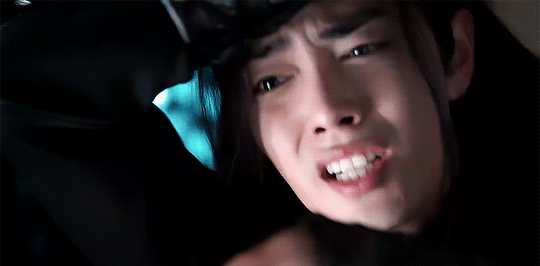
[ID: Wei Wuxian, trembling in fear, screaming “shijie!” as Jiang Cheng threatens him with Fairy in episode 34 of The Untamed drama. /end ID]
I understand that this is like, a very minor, specific detail change, but oh my GOD, it is like. Unparalleled. Every time I think about this change, I get so emotional and disappointed that it’s not in the novel, because I think it strengthens this scene tenfold. In the novel, Wei Wuxian calls out for Lan Zhan, which like, I get it. The story at this point is focused on the development of his romantic feelings for Lan Wangji, so the point of the scene is that the first person he thinks of in a moment of extreme fear is Lan Zhan, which surprises him. That’s fine. Like, it’s fine! But I think it doesn’t have nearly the same weight as Wei Wuxian calling for his sister to save him from his brother.
Having Wei Wuxian call out for his sister drives home the loss that the two of them have suffered, and highlights the relationship they all once had. Jiang Yanli is much more relevant to shuangjie’s narrative than Lan Wangji ever was, and this highlights exactly how deeply the fracturing of their familial relationship cuts. Wangxian gets so much time and focus throughout the rest of the novel. I love that this moment in the show is just about the Yunmeng siblings because that relationship is no less important, you know?
Calling out for Jiang Yanli in the show draws a much cleaner line through the dialogue. “You dare bring her up before me?” to “Don’t you remember what you said to Jin Ling?” It unifies the scene and twists the knife. It also gives us more insight into how fiercely Wei Wuxian was once beloved and protected by his siblings. Jiang Cheng promised to chase all the dogs away from Wei Wuxian when they were children. It’s clear that Jiang Yanli did as well.
Once upon a time, Wei Wuxian’s siblings defended him from his fears, and now one of them is dead and the other is using that fear to hurt him where he’s weakest. The reversal is so painfully juxtaposed, and it’s done with just that one flashback of Wei Wuxian as a child leaping into Jiang Yanli’s arms and calling out her name. Extremely good, economical storytelling. The conversation between shuangjie is much more focused on their own stories independent from Lan Wangji, which I very much appreciate. Wangxian, you’re wonderful, but this ain’t about you, and I don’t think it should be.
2. Extended Jiang Yanli content (and by extension, Jin Zixuan and Mianmian content)
Speaking of absolute goddess Jiang Yanli, I really loved what CQL did with her (unlike my more mixed feelings about Wen Qing). Having her in so many more scenes makes her importance to Jiang Cheng and Wei Wuxian a lot clearer, and we get to experience her as a person rather than an ideal.
On a purely aesthetic level, Jiang Yanli’s styling and character design is so stellar in CQL. The more prevalent design for her is kind of childish in the styling, which I don’t love (I think it’s the donghua influence?). And even I, someone who’s audio drama on main 24/7, personally prefer her CQL voice actor. There’s only a few characters in CQL that I look at and go “ah yes, that’s [character] 100%” and Jiang Yanli is one of them. I was blessed. I would lay down my life for her.
I’m really glad that CQL showed her illness more explicitly and gave her a sword, even if she never uses it! Her weak constitution is only mentioned once in the novel in chapter 69 in like two lines that I blew past initially because I was reading at breakneck speed and was only reminded of when my therapist who I conned into reading mdzs after 8 months of never shutting up oof brought it to my attention like two weeks ago. /o\
We never read about Jiang Yanli carrying a sword in the novel, though we are told that her cultivation is “mediocre”, so we know that she at least does cultivate, even if not very well. Highlighting her poor health in CQL makes her situation more clear, I think, and explains a little more about the way she’s perceived throughout the cultivation world as someone “not worthy of Jin Zixuan”. The novel tells us that Jiang Yanli is not an extraordinary beauty, not very good at cultivation, sort of bland in her expressions, and, very briefly, that she’s in poor health. I really love that description of Jiang Yanli, because it emphasizes that her worth has nothing at all to do with her talents, her health, her cultivation, her physical strength, or her beauty. She is the best person in the whole world, her brothers adore her, and the audience loves and respects her for reasons wholly unrelated to those value judgments. We love her because she is kind, because she is loyal, because she loves so deeply. Tbh, her only imperfection is falling for someone so tragically undeserving of her. (JK, I love you Jin Zixuan, and you do deserve her because you are an excellent boy who grows and changes and learns!! I can’t even be mean to characters as a joke god.)
Anyways, I just think the detail about her health is compelling and informs her character’s position in the world in a very specific way. I’m happy that CQL brought it to the forefront when it was kind of an easily-missed throwaway in the novel. It does mean something to me that Jiang Yanli, despite her poor physical health, is never once seen or treated as a burden by her brothers.
Something partially related that really hit hard was this:


[ID: two gifs. Jiang Yanli peeling lotus pods, looking up uncomfortably as her mother loses her temper about the Wen indoctrination at the table from episode 11 of The Untamed drama. /end ID]
D8 AAAAHHH this was VISCERAL. The novel is quite sparse in a lot of its descriptions and lets the audience fill in the missing details, so Jiang Yanli’s expression and reactions are not described when, after Jiang Cheng quickly volunteers to go to Qishan, Madam Yu accuses her of continuing to “happily peel lotus seeds” in such a dire situation.
“Of course you’ll go,” she snaps to Jiang Cheng. “Or else do you think we should let your sister go?”
This scene triggered me so bad lmfao, so I guess it’s kind of weird that I love it so much, but I felt Seen. Something about the way her nail slips in the second gif as she breaks open the pod is like. Oh, that’s a sense memory! Of me, as a child, witnessing uncomfortable conflict between people I cared about. I know this is an extremely personal bias, but hey, so is this whole meta. Because Jiang Yanli is often silent and quiet, it’s more her behavior and expressions that convey her character. It’s why the moment she lets loose on Jin Zixun is so powerful. We don’t get to see a lot of it in the novel, but because CQL is a visual medium, her character is a lot easier to pin down as a human as opposed to an abstract concept.
Anyways, in this moment, which I also think is a tangential reference to her weak constitution (it doesn’t feel like, “your sister can’t go because she’s a girl”; it feels like, “your sister can’t go because she couldn’t handle it”), we get to see Jiang Yanli’s own reaction to her perceived inadequacy. We see it in other places too—like how upset she is when Jin Zixuan dismisses her in several scenes, but this is the one that hits me the hardest because it’s about how her weakness is going to put her little brother in grave danger.
Last Yunmeng siblings with focus on Jiang Yanli scene that isn’t in the novel that I’m just absolutely wrecked over: the dream sequence in episode 28, when Jiang Yanli dreams about Wei Wuxian sailing away from her, but no matter how she shouts, or how she begs Jiang Cheng to help her, she can’t bring him back home.
I’m not going to gif it because I literally just like, fast-forwarded through it and started sobbing uncontrollably in front of my laptop, dear god.
I don’t know where the CQL writers found the backdoor directly into my brain’s nightmare center, but?? they sure did! IDK, I can see how this might be kind of heavy-handed, but it just. The sensation of being in a dream where something is going terribly wrong, but you’re the only one who seems to see it happening? But there’s nothing you can do? I feel like it’s a very fitting nightmare to give Jiang Yanli, who is acutely aware and constantly reminded of how little power she has in the world: not good enough for the boy she likes, not healthy enough to cultivate well, not strong enough to keep her family together.
The whole, elder siblings trying and failing to protect their younger siblings pattern is A Lot in the story, but there’s something particularly painful about seeing it happen to Jiang Yanli because of that awareness. All the other elder siblings are exceptionally talented or powerful in obvious ways. All Jiang Yanli has is the force of her will and the force of her love, and she knows it isn’t enough.
I care a lot about the Yunmeng siblings, okay! And I think CQL did right by them!
I’m only going to spend two seconds talking about Jin Zixuan and Mianmian, but I DO want to mention them.
Anyways, because we get more Jiang Yanli content, we ALSO get more soft xuanli, which is Very Good. Literally my kingdom for disaster het Jin Zixuan treating my girl right!! CQL said het rights, and I’m not even mad about it! I’m really happy that we get to see a little more of how their relationship plays out, and how hard Jin Zixuan works to change his behavior and apologize to her for his mistakes. The novel is from Wei Wuxian’s POV, so we miss the details, alas. Jin Zixuan covered in mud, planting lotuses? Blessed.
I think part of making Mianmian a larger speaking role is for convenience’s sake, but oh boy do I love that choice. Especially the Jin Zixuan & Mianmian relationship. Like, they’re so clearly platonic, and Mianmian is never once portrayed as a threat to Jiang Yanli. They just care about and respect each other a lot? Jin Zixuan’s distress when she defects from the Jin sect gets me in the heart, because it’s just like. God. I think there’s a lot of interesting potential there for her own thoughts re: Wei Wuxian. After all, she leaves her sect in defense of him, but he later kills a friend that she respects and loves. The moments shared between her and Jin Zixuan are minor, but they hint at a deeper relationship that I’m really glad was in the show.
3. To curb the strong, defend the weak: lantern scene (gusu) + rain scene (qiongqi dao 1.0)
I think I basically already explained why I love this so much in this post (just consider that post and this point to be the same haha), but just. Okay. A short addendum.
As much as I love novel wangxian, I really think that including this scene early on emphasizes why Lan Wangji loves Wei Wuxian so deeply. Of course he thinks Wei Wuxian is attractive, but this is the moment when he realizes, oh, this is who I love. Having that moment to reflect upon throughout Wei Wuxian’s descent is so excellent. I have enumerated all of my issues with the “perfectly righteous Wei Wuxian” arc that CQL crafted, but having this narrative throughline in conjunction with the novel arc would be like. My favored supercanon ahaha. (It would need some tweaking, but I think it would work.) It shows us exactly who it is that Lan Wangji sees and is trying to save, who he thinks is still there, underneath all the carnage and despair and violence and grief. This is the Wei Wuxian Lan Wangji loves and is unwilling to let go. This is the Wei Wuxian that Lan Wangji would kill for, that Lan Wangji would stand beside, that Lan Wangji would live for.
4. Meeting Songxiao
As much as I love the unnameable ache of Wei Wuxian never meeting Xiao Xingchen and learning only about his story through secondhand sources in the novel (and the really cool parallel to that where Xiao Xingchen tells A’Qing the story of Baoshan-sanren’s ill-fated disciples: both Xiao Xingchen and Wei Wuxian learn of each other only through the eyes of others, and that is Very Neat), I think the reversal that this meeting in episode 10 sets up wins out just slightly.
I said once in the tags on one of my posts that “songxiao is the tragic parallel of wangxian” and like. Yeah. Basically! If we take songxiao as romantic, the arc of their relationship happens inversely to wangxian, and that parallel is so much clearer and stronger when we have wangxian meeting songxiao in their youth.
The scene of their meeting really does have that Mood™ of uncertain youth seeing happy and secure adults living out the dreams that they’re afraid to name. Wei Wuxian’s eager little, “oh! just like me and Lan Zhan!! Right, Lan Zhan??” when songxiao talk about cultivating together through shared ideals and not blood is. Well, it’s Something.
When they meet again at Yi City, there’s a greater heaviness to it. So this is what happened to the people you once dreamed of becoming! Wangxian have already come to a point where they have an unspoken understanding of their relationship, but Songxiao have lost everything they once had. When Song Lan looks at wangxian, it’s like looking at a mirror of his past, and everyone in attendance knows it.
To me, that unspoken parallel is really emotionally and thematically valuable. All that good, and here is the tragedy that came of it.
okay, look! I managed to keep it shorter!! here are my honorable mentions: that scene where Jin Guangyao tries to hold Jin Ling and Jin Guangshan refuses to let him (it’s hating Jin Guangshan hours all day every day in this household), the grass butterfly leitmotif for Sizhui (im literally crying right now about it shut up), the Jiang Cheng/Wen Qing sideplot (look I know it’s wild that I actually liked that given that I headcanon JC as aspec, but I actually really like how it played out, specifically because Wen Qing and Wei Wuxian are NOT romantic—it sets up an unexpected and interesting comparison)
um. Anyways. I uh. really care about this story. And have a lot of thoughts, which I’m sure will continue to evolve. Maybe in 8 months I’ll return to this and go well, literally none of this applies anymore, but who knows! It’s how I feel right now. I cried literally three times while writing this because MDZS/CQL reached into my chest and yanked my heart right out of my body, but I had fun! *finger guns*
and like, I know I had a LOT to say about what frustrated me about CQL, but I really really hope it’s clear that I adore the show despite all of that. I talk a lot because I care a lot, and my brain only has one setting.
anon, this was like 1000% more than you bargained for, I’m SURE, (and I’m still exercising some restraint, if you can. believe that.) but I hope that you or someone out there got something out of it! if you made it all the way to the end of this meta, wow!! consider me surprised and grateful!!
time to crawl back into my hovel so I can write Lan Xichen fic and cry
(ko-fi? ;A;)
#the untamed#the untamed meta#mdzs#mdzs meme#mo dao zu shi#mine#mymeta#asks and replies#Anonymous#HOOOOOO BOY GUYS#we are just shy of 10k on this#*buries face in hands*#cyan writes#cyan gets too deep in the weeds#i will be shocked if more than like ten people read this#by the end it was just like well i guess this is just for me now lmfao#anyways. i will now. leave the internet for a while. thanks
3K notes
·
View notes
Text
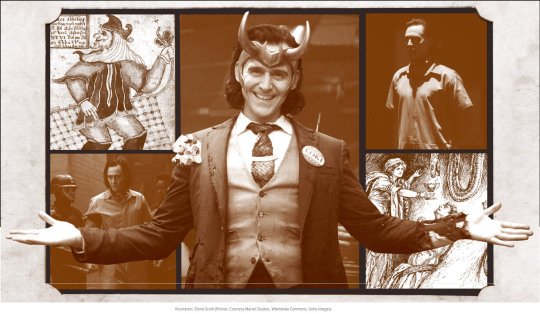
How Loki Shapeshifted From Nordic Folklore to a Marvel Icon
by Sara Durn
There are more than 800 years between the stories of Viking god Loki first being written down and his arrival (in the superb Tom Hiddleston) in the Marvel cinematic universe in 2011’s Thor. The new Disney+ series Loki, set to be released on June 9, is primed to explore more antics of Thor’s trickster brother as he attempts to fix the timeline he helped break in Avengers: Endgame. Among his many talents, Loki has cheated death a few times in the MCU, but that amounts to child’s play for this god.
In Norse mythology, Loki causes just as much confusion as his Marvel iteration. Though there aren’t any stories of him outwitting death, there are plenty of myths where he shapeshifts, swaps genders, or tricks gods into killing other gods. In the Marvel universe, he’s quite prone to allegiance swapping. Let’s dig into this troublemaker’s journey.
What is Loki’s origin?
The legends surrounding the Norse god are first documented in writing around the 13th century, primarily in Iceland. There are two versions of these legends that enter the historical record around the same time—the Poetic Edda and the Prose Edda. The Poetic Edda is an anonymous collection of Old Norse poems that are mainly pulled from an Icelandic medieval manuscript known as the Codex Regius (some of the poems date back to 800 CE). The Prose Edda is an Old Norse textbook for composing poetry that was written by a single author, Snorri Sturluson, a colorful Icelandic historian, scholar, and lawspeaker.
“Within the myths, you can see Loki moving from being just mischievous to being absolutely evil. If you think of him as only being mischievous, he’s actually a creative force and often ends up getting the gods much of their magical possessions, like Thor’s Hammer, through his cunning.”
“Pretty much everything we know about Loki came from Snorri Sturluson,” Viking scholar Nancy Marie Brown, author of Song of the Vikings: Snorri and the Making of Norse Myths, told io9. Brown says this was very appropriate given that “Snorri was quite a trickster figure himself.” While calling him the “Homer of the North,” Brown also acknowledges that Snorri spent a lifetime “double-crossing friends and family… scheming and plotting, blustering and fleeing”— a life that eventually led to his unheroic demise in a nightshirt where his (supposed) final words were “don’t strike!” In both Eddas, Loki is always portrayed as a cunning trickster. In the Prose Edda, Snorri describes Loki as “pleasing and handsome in appearance, evil in character, very capricious in behavior. He possessed to a greater degree than other [gods] the kind of learning that is called cunning.”
Besides appearances, Loki is always getting the gods into trouble and then cleverly extricating them from the mess he’s made. He fathers the Midgard Serpent destined to bring about Ragnarök, the end of the world in Norse mythology. He convinces the blind god Hodr to kill the beautiful and favored god Baldur. He kidnaps the goddess Idun to save his own hide from a furious giant. The mythological character is constantly switching sides—sometimes supporting the gods and sometimes their enemies, the giants. In the MCU, Loki is both hero and villain—in The Avengers he opened a wormhole in New York City releasing alien monsters and in Thor: Ragnarok he helped Thor save the Asgardians from Hela’s wrath.
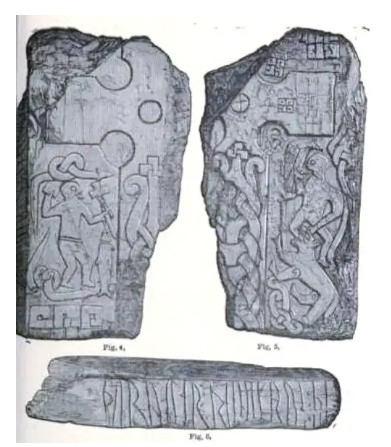
Thorwald’s Cross, a fragmented runestone depicting Odin being consumed. Image: Public Domain
Loki might have begun as a Norse god of fire—fitting considering how fire can be both “helpful and destructive,” said Brown. Fire can both burn down your house and cook you dinner. It’s tricky that way—like Loki. As Brown puts it, “You can see his two sides there [reflected in fire].” Brown also explains that there was likely a transformation in Loki over the centuries. “Within the myths, you can see Loki moving from being just mischievous to being absolutely evil. If you think of him as only being mischievous, he’s actually a creative force and often ends up getting the gods much of their magical possessions, like Thor’s Hammer, through his cunning.” Again, it’s just like Marvel’s Loki, who sometimes helps the other gods out, like when he teamed up with Thor to escape the Grandmaster in Thor: Ragnarok.
What is Loki’s relationship with the Devil?
In the long, slow conversion of the Vikings to Christianity that took place between the 9th and 12th centuries, Loki became a parallel to the Christian Devil. The creative, positive elements of him fell away leaving only the god favored by the Father (Odin/God) before getting cast out. (It does sound a bit like Lucifer, right?) Christianity paints a world that is far more black and white, good vs. evil than the Norse pagan religion—here’s little room for a grey, ambiguous figure like Loki. As Brown puts it, “The Christian religion insists that you’re either with us or against us. Whereas in what we understand of the pagan Viking religion, there were a lot of shades of grey. There was a spectrum on which you could move back and forth. You weren’t all one thing or all the other. You weren’t all female or all male. You weren’t all good or all evil. It was more human.”
Loki always moved fluidly between those two polarities—helping Thor in one story, causing an overthrow of the gods in another. In one tale, Loki shapeshifts into a mare, becoming the mother of Odin’s great 8-legged horse, Sleipnir. In another, he fathers the wolf Fenrir. The Church couldn’t really handle all that grey area Loki liked to inhabit, and so it eventually cast him as the devil himself. “[Monks] had to sort the gods into saints and devils, and Loki by being sexually ambiguous and also morally ambiguous falls into the devil [category],” explained Brown. Though Marvel’s Loki certainly channels a bit of the devil at times, we’ve luckily yet to see him become both mother and father to world-ending, multi-legged monsters in the Marvel Universe. But, there’s still time, especially with the new Disney+ series hitting the small screen.
When was Loki’s Revival?
After the Viking conversion, the Norse myths started to fade, and Loki with them—until the 1600s, when medieval manuscripts like those containing the Prose and Poetic Edda began to be translated. “The reason [these myths] became popular was because of nationalism,” Brown told us. “In the mid to late 1800s, there was the idea that what distinguished one nation from another was its cultural heritage.” This spurred Jacob Ludwig Karl Grimm and Wilhelm Carl Grimm—known to many simply as the Brothers Grimm—to go “collect the stories of the local people to prove that Germany was a nation, not a collection of states. You had the same thing happening in Ireland to prove that they were different from the English and you have the same thing happening in Iceland, Norway, Sweden, and Denmark.” This eventually gave rise to the Nazis appropriating Norse myths in their twisted pursuit of alleging Aryan supremacy.
Following the Civil War, the United States also looked to the Middle Ages to redefine the country’s fractured identity. As Chris Bishop, author of Medievalist Comics and the American Century, explained to io9, “[the Middle Ages] offered an aesthetic that was individualistic (think: the knight errant, Robin Hood, etc.), given to interpretations of exceptionalism (Camelot, the once and future king), venerable (where old equalled established and respectable), and (unlike Classicism) Christian.” The Middle Ages, or more accurately the remixing of the Middle Ages known in academia as “medievalisms,” appealed to many Americans obsessed with ideas of American exceptionalism and singularity in the 19th century. Eventually the U.S.’s obsession with the Middle Ages made its way into comic books starting with Prince Valiant in 1937, a comic strip created by Hal Foster set in and around the legends of King Arthur. Other medievalist comics followed eventually leading to the inclusion of Norse gods like Loki, Thor, and Odin.
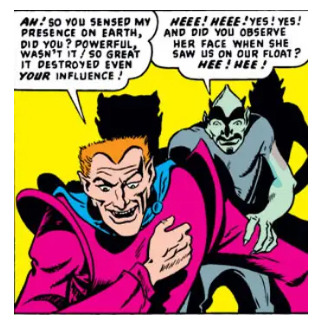
First appearance of Loki in the 1949 Venus comics. Image: Wikicommons
When was Marvel Comics’ Loki introduced?
While Loki first appeared in the 1949 comic book Venus styled after (you guessed it) the devil, the modern-age Loki didn’t hit the comic book scene until co-writers and brothers Stan Lee and Larry Lieber adapted him in 1962’s Journey into Mystery #85. It’s in that issue where Loki “becomes Thor’s enemy/ally/brother/adopted brother/etc,” said Bishop. The mischievous personality of the Norse god remains largely the same in the Loki of the comic books and films and even retains the ability to swap genders at times.
In the comics, Loki is raised as Thor’s brother in Asgard—somewhere the Marvel stories diverge from the Norse mythology. It’s Loki and Odin who are sworn brothers in the Norse myths, not Loki and Thor. As Brown explains, “Loki and Odin are blood brothers, which means they are even closer than real brothers.” In the Viking world, two people who swore a blood oath to one another formed a bond that went beyond kin, and so went the Norse Loki and Odin’s relationship. As Bishop points out, the Loki/Thor dynamic of the comics and movies is a “classic, formulaic archetype.” Thor is the “big, hunky, handsome (but slightly dumb) hero” and Loki is “his slight, quirky but super-smart frenemy. Loki is the dark, misunderstood, vulnerable shadow that audiences can relate to, reach out to, care for. Thor is that dumb jock who everyone looked up to at school, but Loki was that cool, quiet kid who went on to found a tech-empire.”
Why is Loki called a Trickster?
What does remain consistent with Loki is that he always plays the trickster. He is the manifestation of psychologist Carl Jung’s archetype: The trickster disrupts the individual and/or society causing either growth or destruction. Social scientist Helena Bassil-Morozow points out that when it comes to Loki, “despite the fact that the narrative details between the medieval Loki stories and their contemporary versions vary, the main idea remains the same—the trickster mercilessly attacks those in power and nearly causes the end of the world.” Both in the Norse myths and in Marvel, the world needs saving from Loki. He acts as the catalyst for a whole lot of upheaval—upheaval that in the Norse myths causes Ragnarök.
Loki “functions as a locus of salvation (literally, a prodigal son).” Loki just might be a savior. He’s someone audiences can look at and think “if Loki can be redeemed, so too might I.”
Perhaps that’s where the two narratives differ the most. In the Norse tales, the end of the world at Ragnarök is inevitable. Odin and Thor will die. Everything will change. Vikings lived with the knowledge that their world would end. In the MCU, we don’t know how the story ends, plus Ragnarök took place already and yet the Asgardians live on. There’s still hope that Loki will prove to be good and that the other superheroes will save the world from whatever mayhem he’s caused, or so we can hope in the upcoming Disney+ series. As Bishop puts it, Loki “functions as a locus of salvation (literally, a prodigal son).” Loki just might be a savior. He’s someone audiences can look at and think “if Loki can be redeemed, so too might I,” explains Bishop.
While the Vikings’ Loki caused the end of the world, today’s Loki might just save it. Or maybe not. And, perhaps that’s the fun of the trickster—you never quite know what they’ll get up to.
75 notes
·
View notes
Note
Hey. It's been a long time since I had a question. Maybe the 100's demise was the reason.
Now coming to my actual query. This past year I have binged numerous shows ranging from American to korean dramas or Turkish dizis. There is certain thing that I have felt and noticed throughout i.e., the woman characters aren't given even a slight leeway by the audience. If the even make a slight mistake, the audience remembers it always to stand against that character. Whereas if there is a male villain, people gets cheerful seeing even a slight bit of humanity in him. They even wait for its redemption.
Let me take an example of a Turkish show "kara sevda(black love)". A one line synopsis can be put like- two leads who love each other endlessly but can never be together. So, the villain in that show is beyond redemption. That character has fallen so far off that there is no coming back. But still when he is playing with a baby, people's comments are like 'best moment of the show.' 'see he is such a good person'. 'the female lead should accept his love'. Am like what?
And if I tell you about the female lead. She is a good person at heart who is sacrificing love for family. And she is labelled "selfish" by audience. 'She doesn't deserve the male lead' etc. And you know I too felt like that for the majority of the show until I reached the point of self reflect.
Even Clarke from the 100 faced so much hate that there wasn't any visible backlash when in the end the makers made her a villain. The backlash was for Bellamy death and stupid end instead.
Looking through tv series, it's so easy to see why tv or films doesn't have female anti heroes. Male anti heroes are so easy to find and also widely successful like Damon from tvd or Klaus.
What is your take?
Yup!
Yes.
Definitely.
You are absolutely correct. The leeway for female characters to show human imperfection is very, very thin. Meanwhile, a guy can literally blow up a planet, kill his beloved father, have temper tantrums with kicking and screaming and torture the female main characters and fandom-- and the creators-- think that makes him a hero. And the requirements for his redemption, if there are any at all amounts to:
WOOPSIE! I'M SOWWY.
I simply do NOT understand that phenomenon.
I mean, I get the need to relate to darker characters, morally gray characters, to explore our own negative impulses...but the whole tendency is, for me anyway, given a more sinister light when you compare how the audience tends to treat these outright villainous male characters compared to even SLIGHTLY morally gray female characters. Maybe just flawed.
It also interferes with satisfying redemption arcs. Because YES watching someone face their dark past and attempt to become better and be redeemed is a great story... but if male characters only have to wear a cape and be hot to be redeemed.... then that's not a satisfying redemption arc. And if women can't do ANYTHING to be redeemed because they are considered irredeemably selfish or whatever for the same flaws someone's Hot Dark Badboy smirks about and isn't even sorry for? Then we barely even get redemption stories for women.
And that's part of the problem, isn't it? Women aren't allowed the same representation as men... even as flawed characters.
The point of good representation is not to represent only the best, most perfect, most desirable, most successful type of people. The point is to allow everyone of any sex, race, gender, sexuality, religion, class, ability, etc to take part in the full spectrum of humanity in our stories, good and bad and mediocre. A female Mary Sue is just the female version your general male hero. One is considered bad storytelling the other is taken as The Way It Should Be.
Women are not allowed to have flaws in most of our pop culture, or women are ghettoized into only women's fic or romance or YA, or women take backseat to male villains, or whatever.
I'm writing a book where the woman abandoned her child, and she sleeps around and cons people and avoids commitment. I purposely wrote her to be unlikable.... or rather, she's not unlikable, she's clever and funny and weird, but she has characteristics that women aren't supposed to have. She essentially acts like a male anti-hero, until her call to action and she is forced to face her past mistakes. But I know that these are things that audiences say are irredeemable for women. Abandon her own child?? No. Not allowed. Even though plenty of male characters go off on adventures leaving wife and child behind and it isn't even considered a character flaw, just... a male adventurer. Or honestly, just a guy. Sure one who's imperfect, but that old ball and chain was probably the worst, right? He had to move on and now he has a tragic backstory and complexity and oh the audience will probably either want to be him or want to be with him, because, that's how these things work.
Not saying that characters shouldn't be dark, do bad things, have flaws, be anti-heroes, have redemption arcs, or have a deep, multilayered villainy.
But I am saying we might want to be a little more critical about what we consider irredeemable for certain people and what war crimes and abuse we let some characters get away with in the name of bold (white) masculinity.
IS the nature of being a (white) man we look up to someone who destroys other people?
I think that toxic masculinity IS seen as sexy. Unfortunately, that's one of the reasons it's seeped into our culture. Manly (white) men who abandon kids and kill without remorse, but with muscles. Manly (white) men who murder whole regions because bad things happened to them, and smolder while doing it. Manly (white) men who commit genocide regularly, but fall for the heroine and save her once. Manly (white) men who are serial killers but with an intriguing depth.
tbh there's lots more to say on the topic, some of it very controversial. These are the stories we like to hear and the characters we love. And it might be rooted in the toxic masculinity that our society has been selling to us as propaganda for decades, if not centuries-- but we don't like to be told to examine our biases, our tastes, our preferences, or our beliefs. It's threatening to our sense of self.
However, that is how you unravel all sorts of toxic belief systems, from misogyny to racism to homophobia to bigotry of all kinds. I added the (white) to this post after I read through it, because I realized non white male characters are not allowed this leeway, either. So this phenomenon is generally (not always) limited to white men. Why?????
my theory? we're still making the colonialists the heroes of the story, friends.
#misogyny#toxic masculinity#media#anti heroes and villains#colonialism#pop culture#fandom#redemption arcs
34 notes
·
View notes